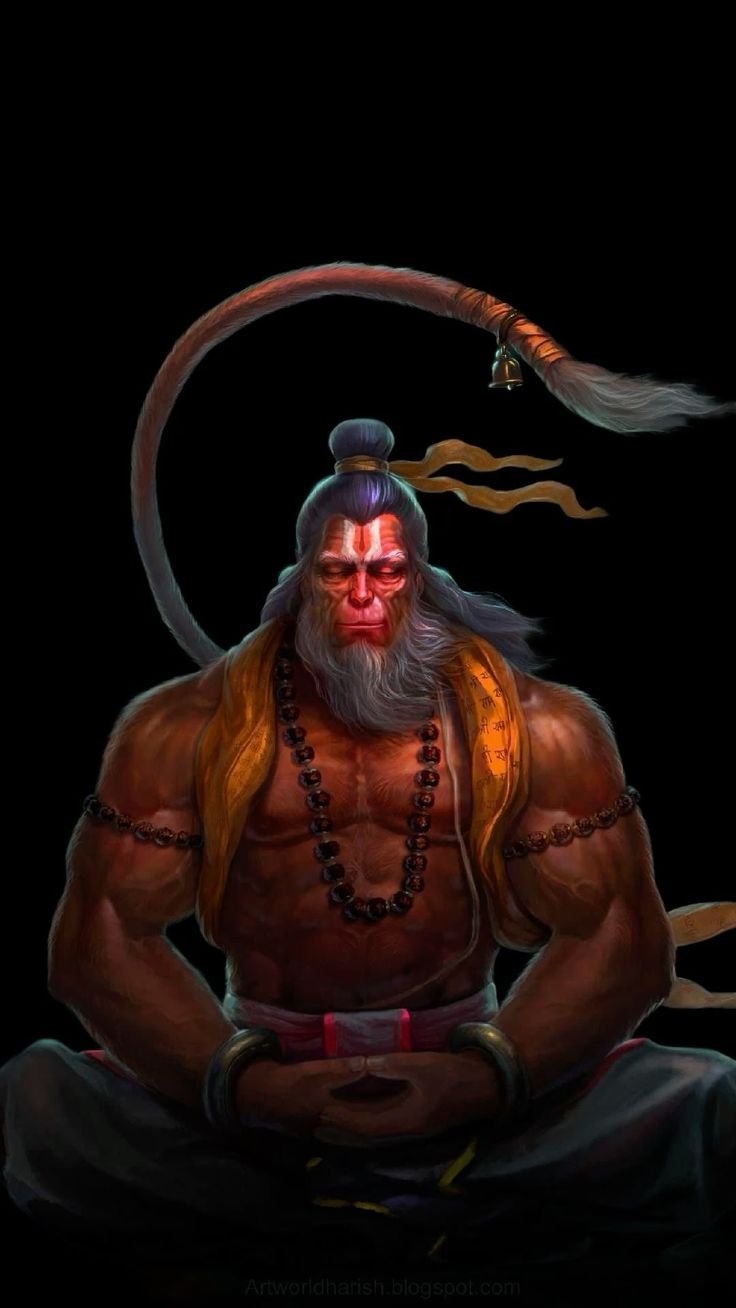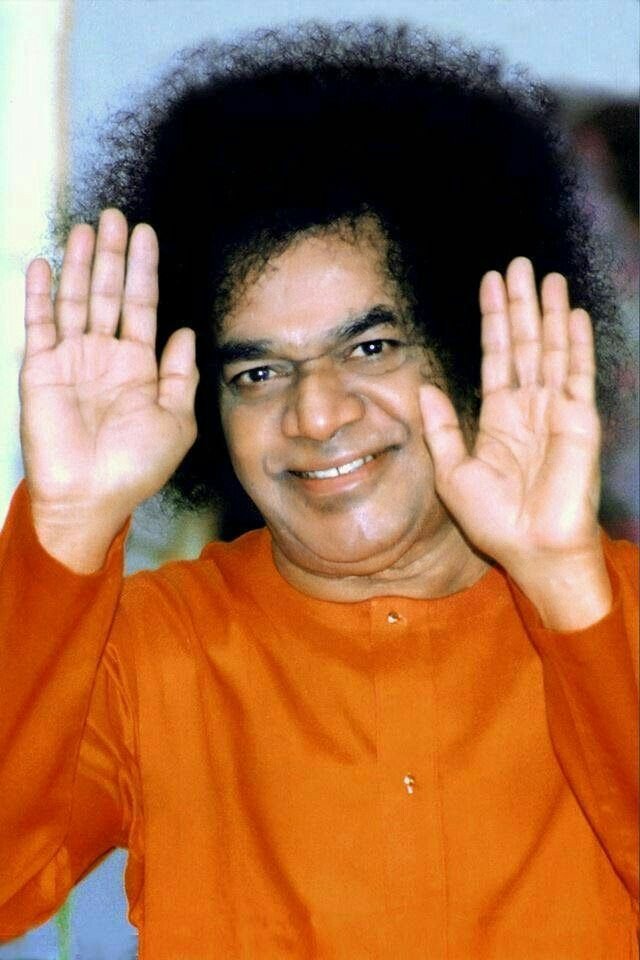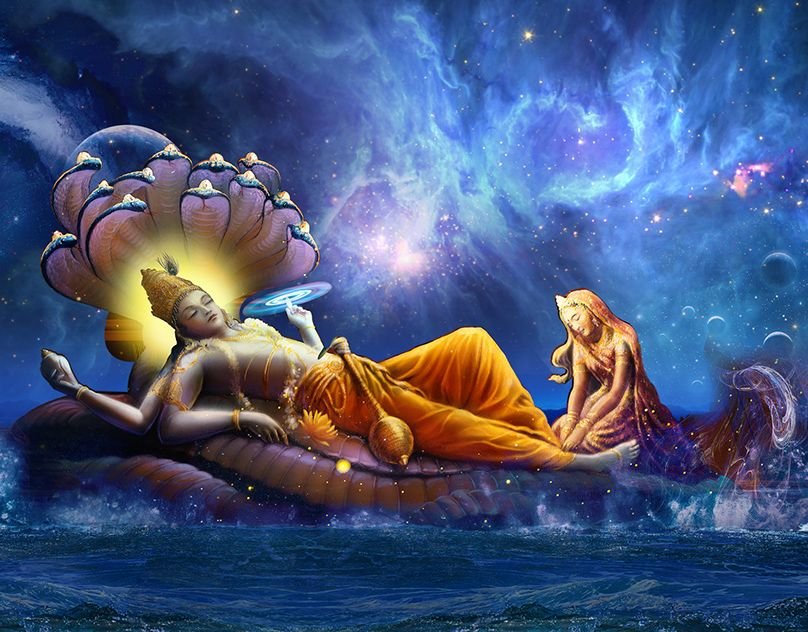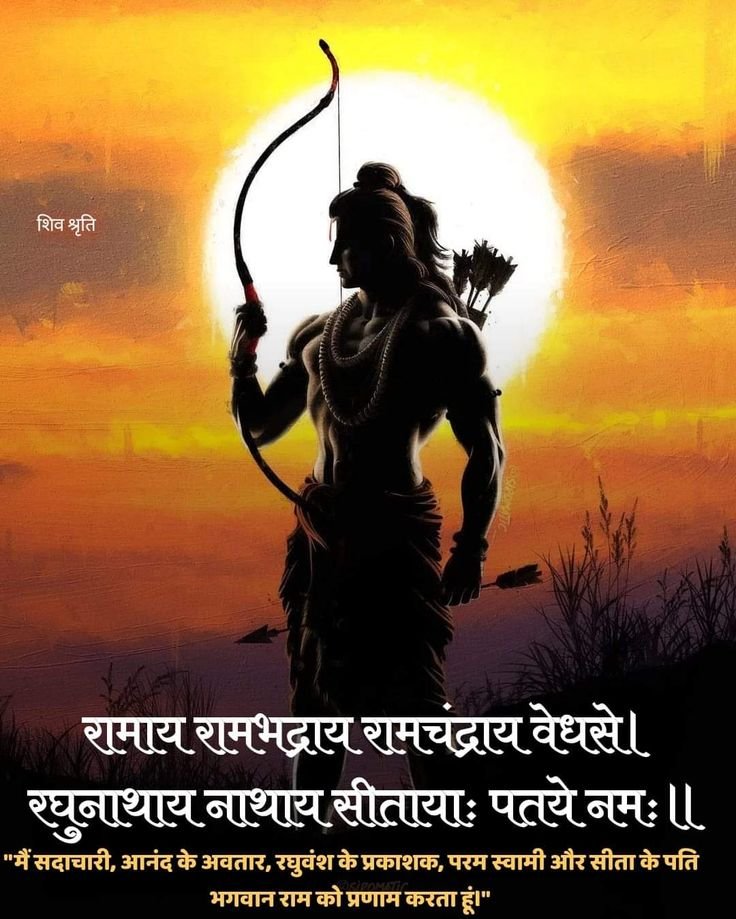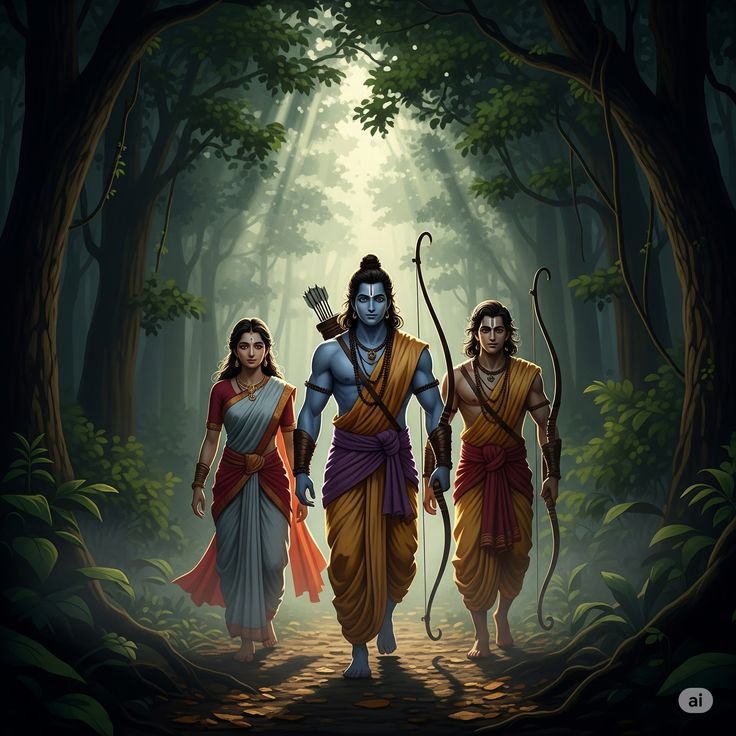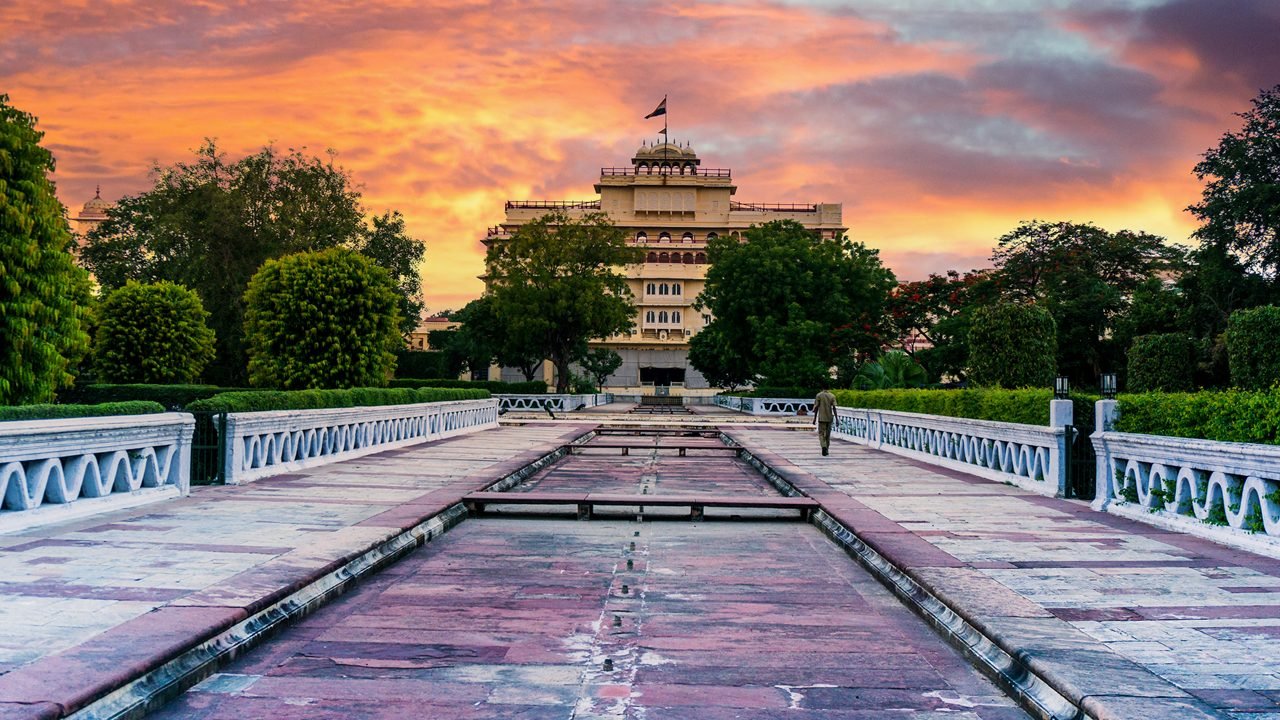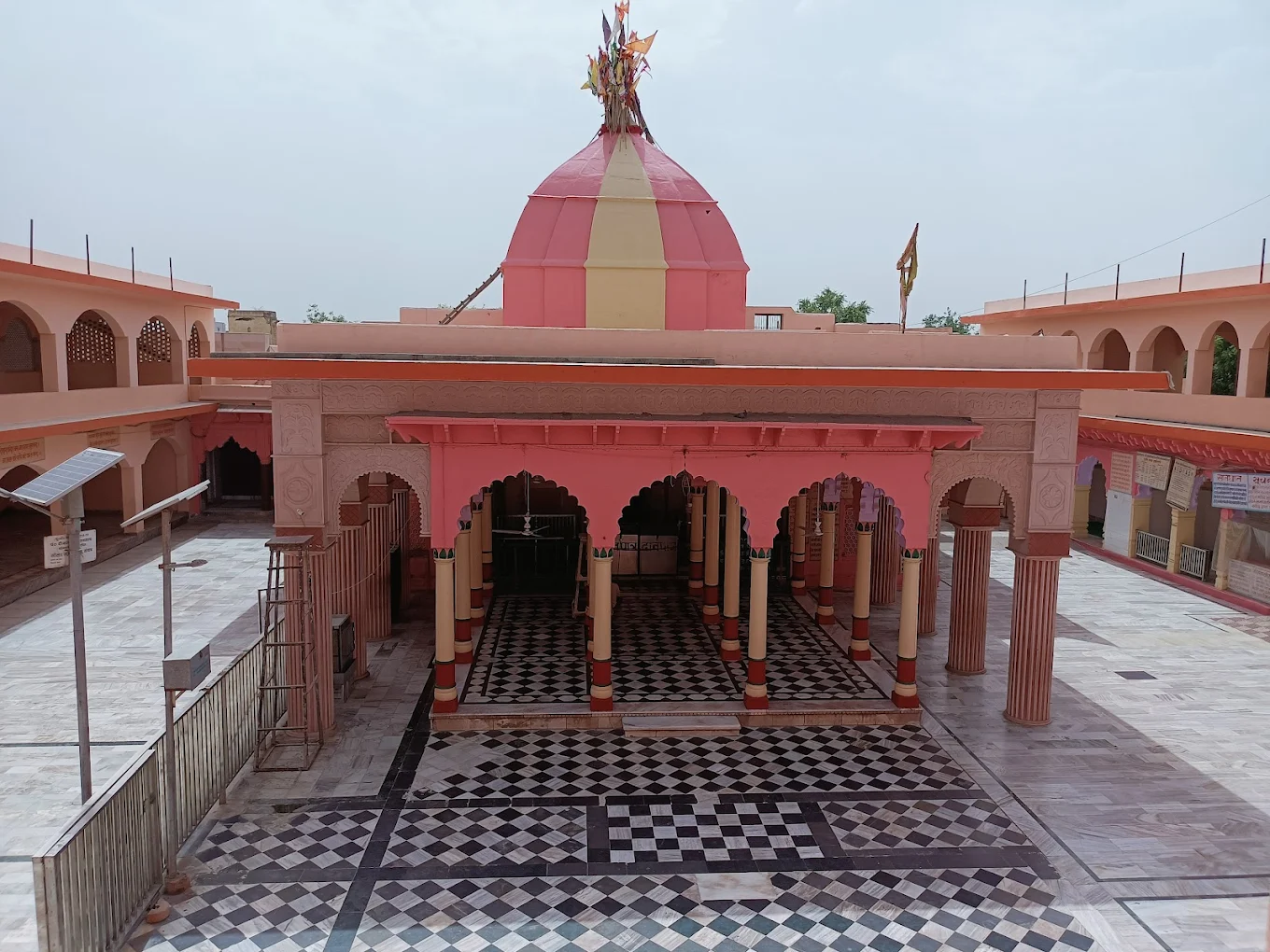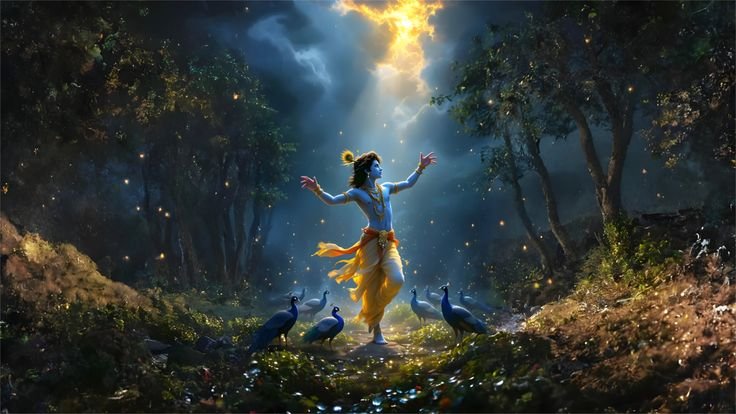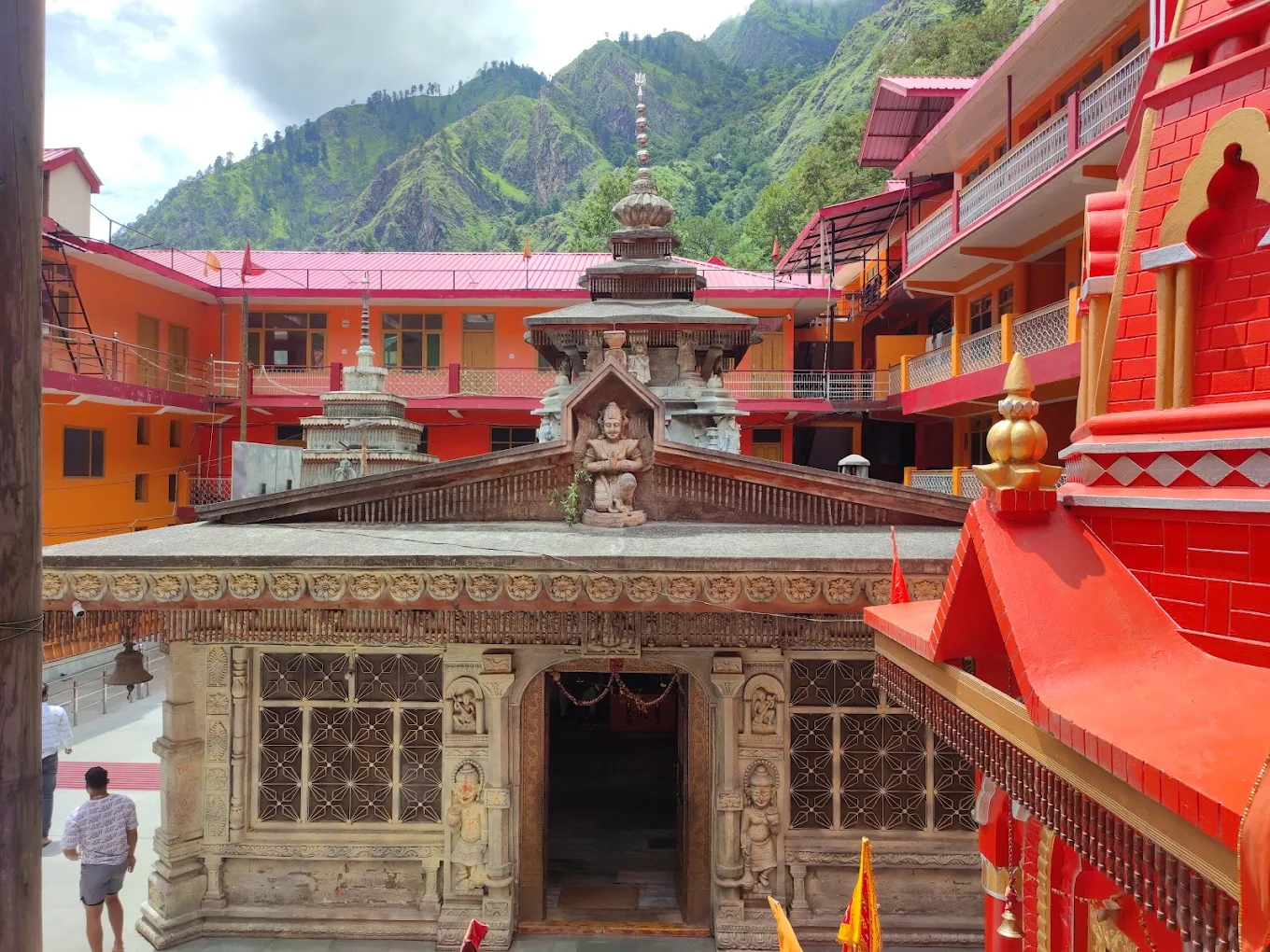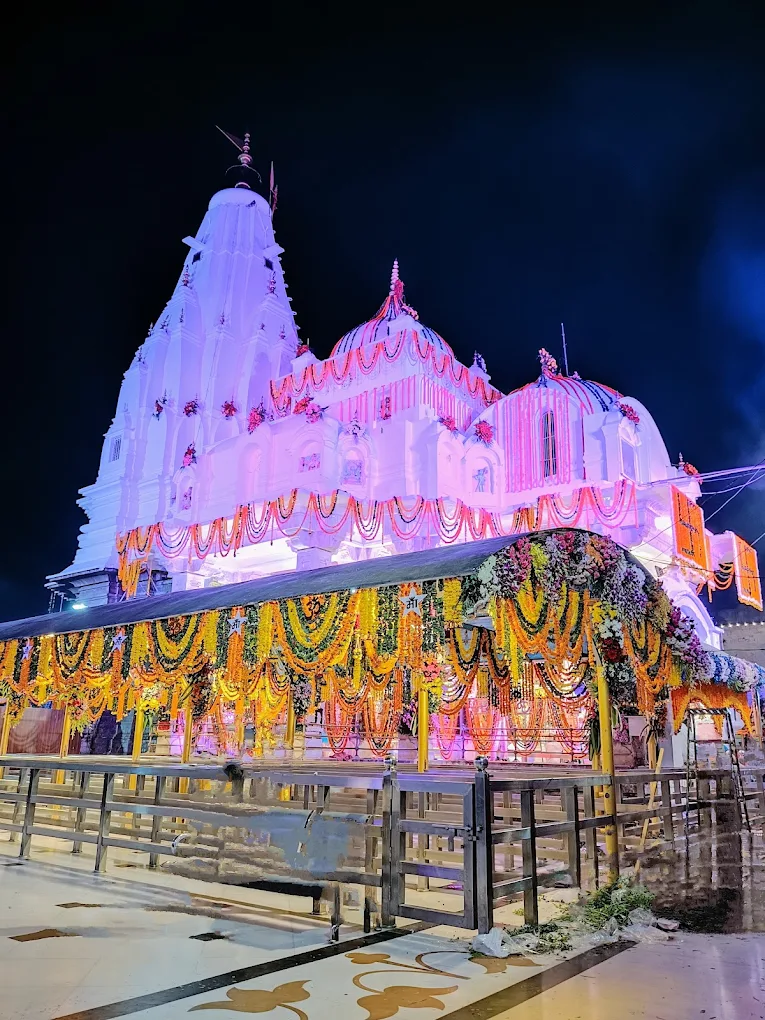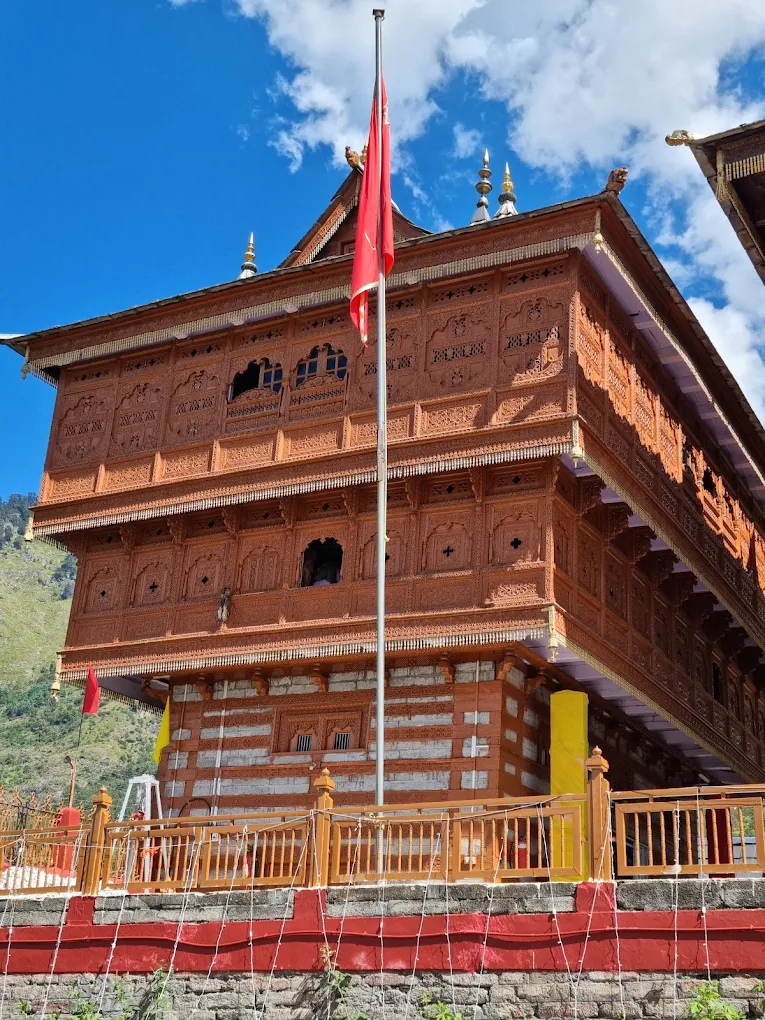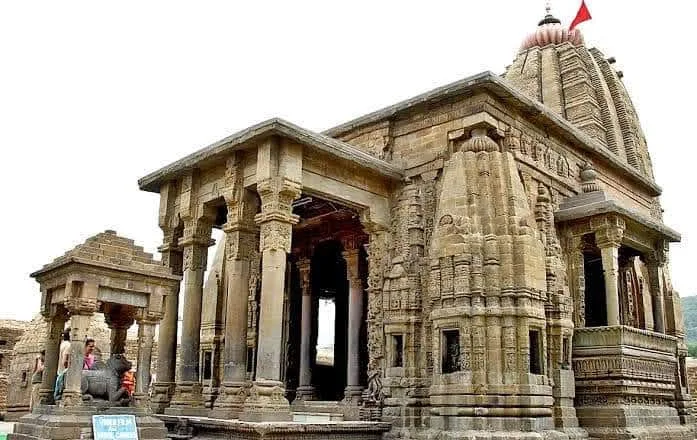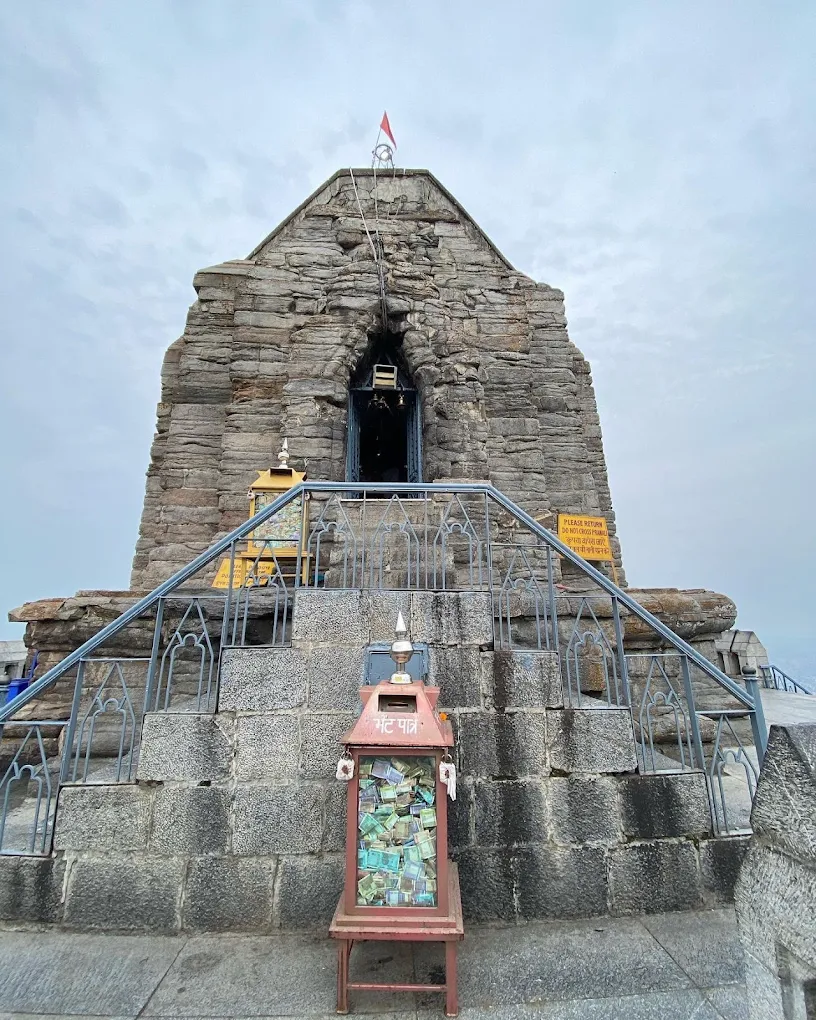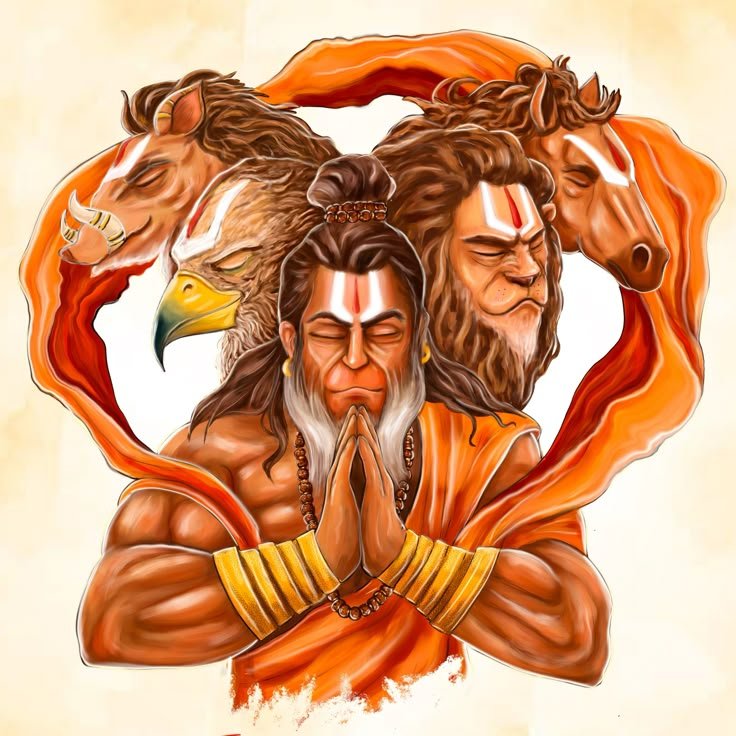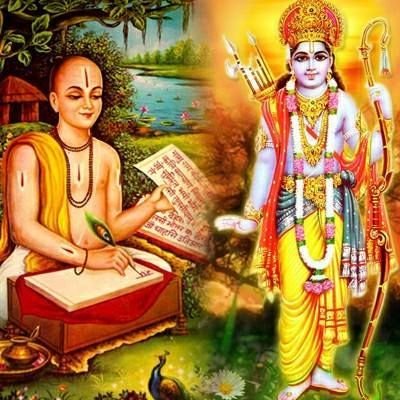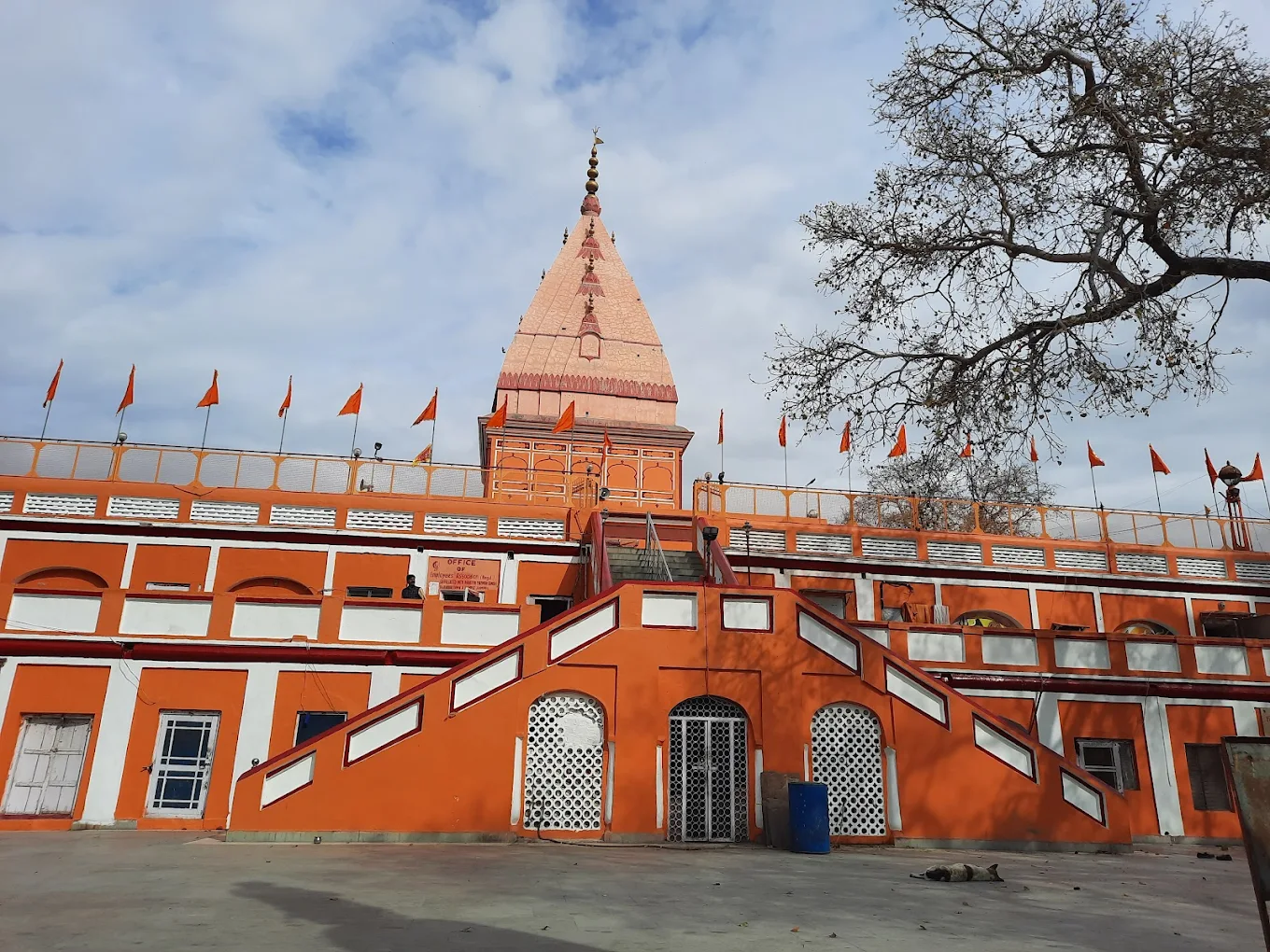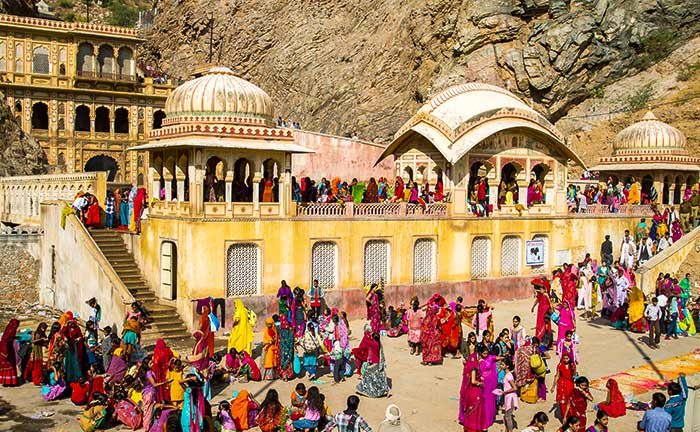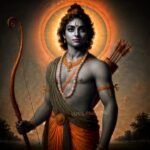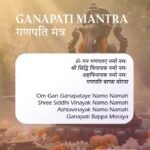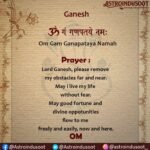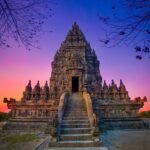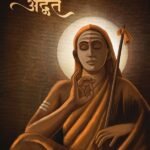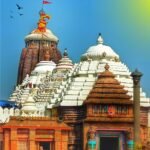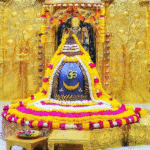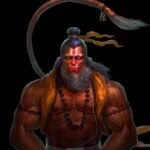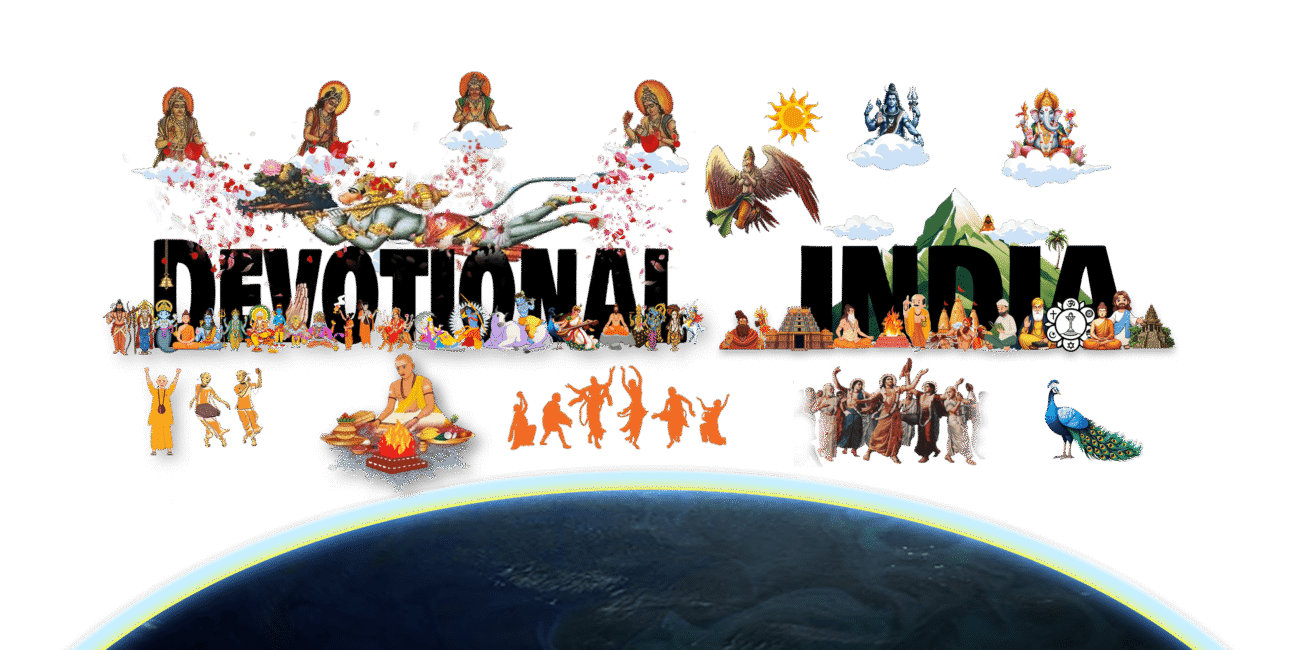Shiva Bhakti
Shalok
करचरण कृतं - Kara Carana Kritam
करचरण कृतं

करचरण कृतं वाक्कायजं कर्मजं वा । श्रवणनयनजं वा मानसं वापराधं ।
विहितमविहितं वा सर्वमेतत्क्षमस्व । जय जय करुणाब्धे श्रीमहादेव शम्भो ॥
Kara-Caranna Krtam Vaak-Kaaya-Jam Karma-Jam Vaa | Shravanna-Nayana-Jam
Vaa Maanasam Va-Aparaadham |
Vihitam-Avihitam Vaa Sarvam-Etat-Kssamasva | Jaya Jaya Karunna-Abdhe
Shrii-Mahaadeva Shambho ||
Meaning:
1: Whatever Sins have been Committed by Actions Performed by my Hands
and Feet, Produced by my Speech and Body, Or my Works,
2: Produced by my Ears and Eyes, Or Sins Committed by my Mind (i.e.
Thoughts),
3: While Performing Actions which are Prescribed (i.e. duties prescribed
by tradition or allotted duties in one’s station of life), As Well as
All other Actions which are Not explicitly Prescribed (i.e. actions done
by self-judgement, by mere habit, without much thinking, unknowingly
etc); Please Forgive Them All,
4: Victory, Victory to You, O Sri Mahadeva Shambho, I Surrender to You,
You are an Ocean of Compassion.
कर्पूरगौरं करुणावतारं - Karpura Gauram
कर्पूरगौरं करुणावतारं

कर्पूरगौरं करुणावतारं संसारसारम् भुजगेन्द्रहारम् ।
सदावसन्तं हृदयारविन्दे भवं भवानीसहितं नमामि ॥
Karpuura-Gauram Karunna-Avataaram Samsaara-Saaram
Bhujage[a-I]ndra-Haaram |
Sadaa-Vasantam Hrdaya-Aravinde Bhavam Bhavaanii-Sahitam Namaami ||
Meaning:
1: Pure White like Camphor, an Incarnation of Compassion,
2: The Essence of Worldly Existence, Whose Garland is the King of
Serpents,
3: Always Dwelling inside the Lotus of the Heart.
4: I Bow to Shiva and Shakti Together.
Stotras
दक्षिणामूर्ति स्तोत्रम् - Dakshinamurthy Stotram
दक्षिणामूर्ति स्तोत्रम्

मौनव्याख्या प्रकटित परब्रह्मतत्त्वं युवानं वर्षिष्ठांते वसद् ऋषिगणैः
आवृतं ब्रह्मनिष्ठैः ।
आचार्येन्द्रं करकलित चिन्मुद्रमानंदमूर्तिं स्वात्मारामं मुदितवदनं
दक्षिणामूर्तिमीडे ॥१॥
Mauna-Vyaakhyaa Prakattita Para-Brahma-Tattvam Yuvaanam
Varssisstthaam-Te Vasad Rssigannaih Aavrtam Brahma-Nisstthaih |
Aacaarye[a-I]ndram Kara-Kalita Cin-Mudram-Aananda-Muurtim
Sva-[A]atmaaraamam Mudita-Vadanam Dakssinnaamuurti-Miidde ||1||
Meaning:
1: (Salutations to Sri Dakshinamurthy) Whose Exposition through Profound
Silence is Awakening the Knowledge of the Supreme Brahman in the Hearts
of His Disciples; Who is Himself Youthful …
2: … but is Sitting Surrounded by Old and Great Sages who are Devoted
to Brahman,
3: The Hands of the Supreme Spiritual Teacher is Forming the Cin-Mudra
(gesture of the Knowledge of Brahman) and Whose Appearance is Still and
Blissful,
4: Who is Rejoicing in His Own Self which is reflected on His Blissful
Face; Salutations to Sri Dakshinamurthy.
वटविटपिसमीपेभूमिभागे निषण्णं सकलमुनिजनानां ज्ञानदातारमारात् ।
त्रिभुवनगुरुमीशं दक्षिणामूर्तिदेवं जननमरणदुःखच्छेद दक्षं नमामि ॥२॥
Vatta-Vittapi-Samiipe-Bhuumi-Bhaage Nissannnnam Sakala-Muni-Janaanaam
Jnyaana-Daataaram-Aaraat | Tri-Bhuvana-Gurum-Iisham
Dakssinnaamuurti-Devam Janana-Maranna-Duhkhac-Cheda Dakssam Namaami
||2||
Meaning:
2.1: Sitting on the ground near the Banyan Tree (Vata), …
2.2: … were all Munis (Sages), who were (sitting) near to the bestower
of Knowledge, …
2.3: … who were (sitting) near to the Guru of the Three Worlds, the
Lord Himself, personified as Dakshinamurthy Deva, …
2.4: … who were (sitting) near to the one, expert in severing the
sorrows resulting from the cycles of Births and Deaths; I bow to that
Dakshinamurthy.
चित्रं वटतरोर्मूले वृद्धाः शिष्या गुरुर्युवा । गुरोस्तु मौनं व्याख्यानं
शिष्यास्तुच्छिन्नसंशयाः ॥३॥
Citram Vatta-Taror-Muule Vrddhaah Shissyaa Gurur-Yuvaa | Guros-Tu Maunam
Vyaakhyaanam Shissyaas-Tuc-Chinna-Samshayaah ||3||
Meaning:
3.1: It is indeed a strange picture to behold; At the root (i.e. base)
of a Banyan Tree (Vata) are seated old Disciples (i.e. aged Disciples)
in front of an Young Guru,
3.2: The Guru is Silent, and Silence is His exposition (of the Highest
Knowledge); and that (Silence) is severing the doubts (automatically)
from the minds of the Disciples.
निधये सर्वविद्यानां भिषजे भवरोगिणाम् । गुरवे सर्वलोकानां दक्षिणामूर्तये
नमः ॥४॥
Nidhaye Sarva-Vidyaanaam Bhissaje Bhava-Roginnaam | Gurave
Sarva-Lokaanaam Dakssinnaamuurtaye Namah ||4||
Meaning:
4.1: (Salutations to Sri Dakshinamurthy) Who is a receptacle to all
Knowledge, Who is a Medicine to all the diseases of Worldly bondage,
4.2: Who is a Guru to all the Worlds; Salutations to Sri Dakshinamurthy.
ॐ नमः प्रणवार्थाय शुद्धज्ञानैकमूर्तये । निर्मलाय प्रशान्ताय
दक्षिणामूर्तये नमः ॥५॥
Om Namah Prannava-Arthaaya Shuddha-Jnyaanai[a-E]ka-Muurtaye | Nirmalaaya
Prashaantaaya Dakssinnaamuurtaye Namah ||5||
Meaning:
5.1: (Salutations to Sri Dakshinamurthy) Salutations to the embodiment
of Pranava (Om), Salutations to the personification of the Pure,
Non-Dual Knowledge,
5.2: Salutations to the Pure and Stainless, and Salutations to the
Tranquil; Salutations to Sri Dakshinamurthy.
चिद्घनाय महेशाय वटमूलनिवासिने । सच्चिदानन्दरूपाय दक्षिणामूर्तये नमः ॥६॥
Cid-Ghanaaya Mahe[aa-Ii]shaaya Vatta-Muula-Nivaasine |
Sac-Cid-Aananda-Ruupaaya Dakssinnaamuurtaye Namah ||6||
Meaning:
6.1: (Salutations to Sri Dakshinamurthy) Salutations to the one Who is
(as if) Consciousness Solidified, Salutations to the Mahesha (the Great
God), Salutations to the One Who dwell at the root (i.e. base) of the
Banyan Tree (Vata),
6.2: Salutations to the embodiment of Sacchidananda (Existence,
Consciousness, Bliss); Salutations to Sri Dakshinamurthy.
ईश्वरो गुरुरात्मेति मूर्तिभेदविभागिने । व्योमवद् व्याप्तदेहाय
दक्षिणामूर्तये नमः ॥७॥
Iishvaro Gurur-Aatme[a-I]ti Muurti-Bheda-Vibhaagine | Vyoma-Vad
Vyaapta-Dehaaya Dakssinnaamuurtaye Namah ||7||
Meaning:
7.1: “Ishwara – Guru – Atman”; (Underlying) these different forms of
(apparent) separation, …
7.2: … like a Sky (i.e. Spiritual Sky or Chidakasha) Who pervades,
Salutations to that Dakshinamurthy.
विश्वं दर्पणदृश्यमाननगरीतुल्यं निजान्तर्गतं पश्यन्नात्मनि मायया
बहिरिवोद्भूतं यथा निद्रया । यः साक्षात्कुरुते प्रबोधसमये
स्वात्मानमेवाद्वयं तस्मै श्रीगुरुमूर्तये नम इदं श्रीदक्षिणामूर्तये ॥१॥
Vishvam Darpanna-Drshyamaana-Nagarii-Tulyam Nija-Antargatam
Pashyann-Aatmani Maayayaa Bahir-Ivo[a-U]dbhuutam Yathaa Nidrayaa | Yah
Saakssaat-Kurute Prabodha-Samaye Sva-[A]atmaanam-Eva-Advayam Tasmai
Shrii-Guru-Muurtaye Nama Idam Shrii-Dakssinnaamuurtaye ||1||
Meaning:
(Salutations to Sri Dakshinamurthy Who Awakens the Glory
of the Atman within us through His Profound Silence)
1.1: The Entire World is Like a City Seen within a Mirror, the Seeing
happening within One’s Own Being,
1.2: It is a Witnessing happening within the Atman, (the Witnessing) of
the Externally Projected World; Projected by the Power of Maya; As if a
Dream in Sleep,
1.3: One Experiences this Directly (this Play of Maya) during Spiritual
Awakening within the Non-Dual Expanse of One’s Own Atman,
1.4: Salutations to Him, the Personification of Our Inner Guru Who
Awakens This Knowledge through His Profound Silence; Salutation to Sri
Dakshinamurthy.
बीजस्याऽन्तरिवाङ्कुरो जगदिदं प्राङ्गनिर्विकल्पं पुनः
मायाकल्पितदेशकालकलना वैचित्र्यचित्रीकृतम् । मायावीव विजृम्भयत्यपि
महायोगीव यः स्वेच्छया तस्मै श्रीगुरुमूर्तये नम इदं श्रीदक्षिणामूर्तये
॥२॥
Biijasya-Antar-Iva-Angkuro Jagad[t]-Idam Praangga-Nirvikalpam Punah
Maayaa-Kalpita-Desha-Kaala-Kalanaa Vaicitrya-Citrii-Krtam | Maayaavi-Iva
Vijrmbhayaty-Api Mahaa-Yogi-Iva Yah Sve[a-I]cchayaa Tasmai
Shrii-Guru-Muurtaye Nama Idam Shrii-Dakssinnaamuurtaye ||2||
Meaning:
(Salutations to Sri Dakshinamurthy Who Awakens the Glory of the Atman
within us through His Profound Silence)
2.1: This World is Like a Sprout of a Seed Within which transforms what
is Changeless state Before, appear Again …
2.2: … as Space and Time, and endless Varieties of Pictures over it;
all due to the Creation of Maya,
2.3: This Unfolding of the World (from the Seed) which is Like a Play of
a Magician, happens to one Who is Like a Mahayogi out of His Own Free
Will (i.e. a Mahayogi can enter the state of Samadhi out of his own free
will and witness the unfolding of the world when He comes out of
Samadhi),
2.4: Salutations to Him, the Personification of Our Inner Guru Who
Awakens This Knowledge through His Profound Silence; Salutation to Sri
Dakshinamurthy.
यस्यैव स्फुरणं सदात्मकमसत्कल्पार्थकं भासते साक्षात्तत्त्वमसीति वेदवचसा
यो बोधयत्याश्रितान् । यत्साक्षात्करणाद्भवेन्न पुनरावृत्तिर्भवाम्भोनिधौ
तस्मै श्रीगुरुमूर्तये नम इदं श्रीदक्षिणामूर्तये ॥३॥
Yasya-Eva Sphurannam Sada[a-A]atmakam-Asat-Kalpa-Arthakam Bhaasate
Saakssaat-Tat-Tvam-Asi-Iti Veda-Vacasaa Yo Bodhayaty-Aashritaan |
Yat-Saakssaat-Karannaad-Bhaven-Na Punaraavrttir-Bhavaam-Bho-Nidhau
Tasmai Shrii-Guru-Muurtaye Nama Idam Shrii-Dakssinnaamuurtaye ||3||
Meaning:
(Salutations to Sri Dakshinamurthy Who Awakens the Glory of the Atman
within us through His Profound Silence)
3.1: By This Throb Alone which is of the Nature of Eternal Underlying
Awareness, the Unreal Forms get their Meanings and Appear over the
Mind,
3.2: This Knowledge of the Atman Spoken of in the Vedas as
“Tat-Tvam-Asi” is Imparted by Our Inner Guru as a Direct Experience when
we Surrender Whole-Heartedly to Him,
3.3: By Direct Experience of this Knowledge, the Delusion of being
tossed within an unending Ocean of Worldly Existence will Not Appear
Again,
3.4: Salutations to Him, the Personification of Our Inner Guru Who
Awakens This Knowledge through His Profound Silence; Salutation to Sri
Dakshinamurthy.
नानाच्छिद्रघटोदरस्थितमहादीपप्रभा भास्वरं ज्ञानं यस्य तु
चक्षुरादिकरणद्वारा वहिः स्पन्दते । जानामीति तमेव भान्तमनुभात्येतत्समस्तं
जगत् तस्मै श्रीगुरुमूर्तये नम इदं श्रीदक्षिणामूर्तये ॥४॥
Naanaac-Chidra-Ghatto[a-U]dara-Sthita-Mahaa-Diipa-Prabhaa Bhaasvaram
Jnyaanam Yasya Tu Cakssur-Aadi-Karanna-Dvaaraa Vahih Spandate |
Jaanaam-Iiti Tam-Eva Bhaantam-Anubhaaty-Etat-Samastam Jagat Tasmai
Shrii-Guru-Muurtaye Nama Idam Shrii-Dakssinnaamuurtaye ||4||
Meaning:
(Salutations to Sri Dakshinamurthy Who Awakens the Glory
of the Atman within us through His Profound Silence)
4.1: As the Light of a Great Lamp Situated Inside a Pitcher having Many
Holes, Shine Outwards, …
4.2: … similarly, the Knowledge of That Only (i.e. Atman) Throb
Outwards through our Eyes and Other Sense Organs,
4.3: “I Know”, He Alone Shining (i.e Atman), This Entire World Shines
…
4.4: Salutations to Him, the Personification of Our Inner Guru Who
Awakens This Knowledge through His Profound Silence; Salutation to Sri
Dakshinamurthy.
देहं प्राणमपीन्द्रियाण्यपि चलां बुद्धिं च शून्यं विदुः
स्त्रीबालान्धजडोपमास्त्वहमिति भ्रान्ता भृशं वादिनः ।
मायाशक्तिविलासकल्पितमहाव्यामोहसंहारिणे तस्मै श्रीगुरुमूर्तये नम इदं
श्रीदक्षिणामूर्तये ॥५॥
Deham Praannam-Api-Indriyaanny-Api Calaam Buddhim Ca Shuunyam Viduh
Strii-Baala-Andha-Jaddo(a-U)pamaas-tv[u-]Aham-Iti Bhraantaa Bhrsham
Vaadinah | Maayaa-Shakti-Vilaasa-Kalpita-Mahaa-Vyaamoha-Samhaarinne
Tasmai Shrii-Guru-Muurtaye Nama Idam Shrii-Dakssinnaamuurtaye ||5||
Meaning:
(Salutations to Sri Dakshinamurthy Who Awakens the Glory of the Atman
within us through His Profound Silence)
5.1: Those who Consider the Body or Prana (Vital Force) or Sense Organs
or the Changing Mind or the Void (Total Non-Existence) …
5.2: … as the “I”, are Like a Naive Innocent Girl Child, or a Blind,
or a Dull-Headed; they are Deluded but they Vehemently Assert their
Points,
5.3: The Inner Guru Destroys this Great Delusion Created by the Play of
the Power of Maya,
5.4: Salutations to Him, the Personification of Our Inner Guru Who
Awakens This Knowledge through His Profound Silence; Salutation to Sri
Dakshinamurthy.
राहुग्रस्तदिवाकरेन्दुसदृशो मायासमाच्छादनात् सन्मात्रः करणोपसंहरणतो
योऽभूत्सुषुप्तः पुमान् । प्रागस्वाप्समिति प्रबोधसमये यः प्रत्यभिज्ञायते
तस्मै श्रीगुरुमूर्तये नम इदं श्रीदक्षिणामूर्तये ॥६॥
Raahu-Grasta-Divaakare[a-I]ndu-Sadrsho Maayaa-Sama-[A]acchaadanaat
San-Maatrah Karanno[a-U]pasangharannato Yo[a-A]bhuut-Sussuptah Pumaan |
Praag-Asvaapsam-Iti Prabodha-Samaye Yah Pratyabhijnyaayate Tasmai
Shrii-Guru-Muurtaye Nama Idam Shrii-Dakssinnaamuurtaye ||6||
Meaning:
(Salutations to Sri Dakshinamurthy Who Awakens the Glory of the Atman
within us through His Profound Silence)
6.1: Just Like the Sun and the Moon are Eclipsed by Rahu, the Pure
Consciousness is Eclipsed by Maya (for a spiritually ignorant
person),
6.2: A Spiritually Elevated Soul can enter that state of Unborn Deep
Sleep (i.e. Pure Consciousness) by Withdrawing His Sense Organs to such
an extent that Only the Real Essence remains,
6.3: That state (i.e. Pure Consciousness) is experienced during
Spiritual Awakening whereby one clearly Perceives that “Before I was
Sleeping” (by being eclipsed by Maya),
6.4: Salutations to Him, the Personification of Our Inner Guru Who
Awakens This Knowledge through His Profound Silence; Salutation to Sri
Dakshinamurthy.
बाल्यादिष्वपि जाग्रदादिषु तथा सर्वास्ववस्थास्वपि
व्यावृत्तास्वनुवर्तमानमहमित्यन्तः स्फुरन्तं सदा । स्वात्मानं प्रकटीकरोति
भजतां यो मुद्रयाभद्रया तस्मै श्रीगुरुमूर्तये नम इदं श्रीदक्षिणामूर्तये
॥७॥
Baalya-Adissv(u)-Api Jaagrad-Aadissu Tathaa
Sarvaasv[u]-Avasthaasv[u]-Api
Vyaavrttaasv[u]-Anu-Vartamaanam-Aham-Ity[i]-Antah Sphurantam Sadaa |
Sva-[A]atmaanam Prakattii-Karoti Bhajataam Yo Mudrayaa-Bhadrayaa Tasmai
Shrii-Guru-Muurtaye Nama Idam Shrii-Dakssinnaamuurtaye ||7||
Meaning:
(Salutations to Sri Dakshinamurthy Who Awakens the Glory of the Atman
within us through His Profound Silence)
7.1: During Boyhood and Other stages of Life (Youth, Old age etc),
during Waking and Other states (Dreaming, Deep Sleep, Turiya etc) and
Similarly in All Conditions …
7.2: … the Atman Always Shines as the “I” Within, Free from All
Conditions but at the same time Present in All Conditions,
7.3: The Inner Guru Awakens this Knowledge of One’s Own Atman to those
who Surrender to Him; this Knowledge which is represented by the
Auspicious Cin-Mudra,
7.4: Salutations to Him, the Personification of Our Inner Guru Who
Awakens This Knowledge through His Profound Silence; Salutation to Sri
Dakshinamurthy.
विश्वं पश्यति कार्यकारणतया स्वस्वामिसम्बन्धतः शिष्याचार्यतया तथैव
पितृपुत्राद्यात्मना भेदतः । स्वप्ने जाग्रति वा य एष पुरुषो
मायापरिभ्रामितः तस्मै श्रीगुरुमूर्तये नम इदं श्रीदक्षिणामूर्तये ॥८॥
Vishvam Pashyati Kaarya-Kaaranna-Tayaa Svasvaami-Sambandhatah
Shissya-[A]acaarya-Tayaa Tatha-Eva Pitr-Putraady[i]-Aatmanaa Bhedatah |
Svapne Jaagrati Vaa Ya Essa Purusso Maayaa-Paribhraamitah Tasmai
Shrii-Guru-Muurtaye Nama Idam Shrii-Dakssinnaamuurtaye ||8||
Meaning:
(Salutations to Sri Dakshinamurthy Who Awakens the Glory of the Atman
within us through His Profound Silence)
8.1: The Differentiations that we See in the World as Cause and Effect,
as Possessor-Possession Relations, …
8.2: … as the Disciple-Teacher, and Also as Father-Son Relations etc,
are all Differentiations within the One Atman,
8.3: In Dream or Waking state, He, the One Purusha is always present,
and (as if) Maya Wanders over Him and gives rise to all these
Differentiations,
8.4: Salutations to Him, the Personification of Our Inner Guru Who
Awakens This Knowledge through His Profound Silence; Salutation to Sri
Dakshinamurthy.
भूरम्भांस्यनलोऽनिलोऽम्बरमहर्नाथो हिमांशु पुमान् इत्याभाति चराचरात्मकमिदं
यस्यैव मूर्त्यष्टकम् नान्यत् किञ्चन विद्यते विमृशतां
यस्मात्परस्माद्विभोः तस्मै श्रीगुरुमूर्तये नम इदं श्रीदक्षिणामूर्तये ॥९॥
Bhuur-Ambhaamsy-Analo-[A]nilo-[A]mbaram-Aharnaatho Himaamshu Pumaan
Ity[i]-Aabhaati Cara-Acara-[A]atmakam-Idam Yasya-Eva Muurty[i]-Assttakam
Naanyat Kin.cana Vidyate Vimrshataam Yasmaat-Parasmaad-Vibhoh Tasmai
Shrii-Guru-Muurtaye Nama Idam Shrii-Dakssinnaamuurtaye ||9||
Meaning:
(Salutations to Sri Dakshinamurthy Who Awakens the Glory of the Atman
within us through His Profound Silence)
9.1: Earth, Water, Fire, Air, Space, Sun, Moon and Jiva, …
9.2: … are Verily His (i.e. Atman’s) Eight Manifestations Shining
within the Moving and the Non-Moving forms,
9.3: Apart from Him (i.e. Atman) there Cannot Exist anything; The Yogis
who Reflect (i.e. Meditate) within Discover Him as the Essence From
Which Everything Originates, … Discover Him as Existing Beyond
Everything as the Eternal Essence,
9.4: Salutations to Him, the Personification of Our Inner Guru Who
Awakens This Knowledge through His Profound Silence; Salutation to Sri
Dakshinamurthy.
सर्वात्मत्वमिति स्फुटीकृतमिदं यस्मादमुष्मिन् स्तवे तेनास्य
श्रवणात्तदर्थमननाद्ध्यानाच्च संकीर्तनात् । सर्वात्मत्वमहाविभूतिसहितं
स्यादीश्वरत्वं स्वतः सिद्ध्येत्तत्पुनरष्टधा परिणतं चैश्वर्यमव्याहतम्
॥१०॥
Sarva-[A]atmatvam-Iti Sphuttii-Krtam-Idam Yasmaad-Amussmin Stave
Tena-Asya Shravannaat-Tadartha-Mananaad-Dhyaanaac-Ca Sangkiirtanaat |
Sarva-(A)atmatva-Mahaa-Vibhuuti-Sahitam Syaad-Iishvaratvam Svatah
Siddhyet-Tat-Punar-Assttadhaa Parinnatam Ca-[A]ishvaryam-Avyaahatam
||10||
Meaning:
(Salutations to Sri Dakshinamurthy Who Awakens the Glory
of the Atman within us through His Profound Silence)
10.1: Since the Divine Essence in All is Made Clear in this Hymn,
10.2: Hence by Listening to It, Contemplating on its Meaning, Meditating
on It, and Glorifying it,
10.3: One becomes Endowed with the Greatness of the Knowledge of the
Divine Essence ( present in All ); Perhaps the Divine Essence by Itself
…
10.4: … will Awaken within him after that Again, the Eightfold
Manifestations of Divine Powers (Siddhis) Unimpeded.
कालभैरवाष्टकम् - Kalabhairava Ashtakam
कालभैरवाष्टकम्

देवराजसेव्यमानपावनांघ्रिपङ्कजं व्यालयज्ञसूत्रमिन्दुशेखरं कृपाकरम् । नारदादियोगिवृन्दवन्दितं दिगंबरं काशिकापुराधिनाथकालभैरवं भजे ॥१॥
Deva-Raaja-Sevyamaana-Paavana-Angghri-Pangkajam Vyaala-Yajnya-Suutram-Indu-Shekharam Krpaakaram | Naarada-[A]adi-Yogi-Vrnda-Vanditam Digambaram Kaashikaa-Pura-Adhinaatha-Kaalabhairavam Bhaje ||1||
Meaning: 1.1: (Salutations to Sri Kalabhairava) Whose Lotus-Feet is Served by Indra, the King of the Devas. 1.2: Who has a Snake as His Sacrificial Thread, Moon on His Head and Who is Extremely Compassionate. 1.3: Who is Praised by sage Narada and other Yogis, and Who is Digambara (Clothed by Sky, signifying that He is Ever-Free). 1.4: Salutations to Sri Kalabhairava Who is the Supreme Lord of the City of Kashi.
भानुकोटिभास्वरं भवाब्धितारकं परं नीलकण्ठमीप्सितार्थदायकं त्रिलोचनम् । कालकालमंबुजाक्षमक्षशूलमक्षरं काशिकापुराधिनाथकालभैरवं भजे ॥२॥
Bhaanu-Kotti-Bhaasvaram Bhavaabdhi-Taarakam Param Niila-Kannttham-Iipsita-Artha-Daayakam Trilocanam | Kaala-Kaalam-Ambuja-Akssam-Akssa-Shuulam-Akssaram Kaashikaa-Pura-Adhinaatha-Kaalabhairavam Bhaje ||2||
Meaning: 2.1: (Salutations to Sri Kalabhairava) Who has the Brilliance of a Million Suns, Who Rescues us from the Ocean of Worldly Existence and Who is Supreme. 2.2: Who has a Blue Throat, Who Bestows us with Worldly Prosperity which we Wish for and Who has Three Eyes. 2.3: Who is the Death of the Death [i.e. beyond death], Who is Lotus-Eyed, Whose Trident Supports the Three Worlds and Who is Imperishable. 2.4: Salutations to Sri Kalabhairava Who is the Supreme Lord of the City of Kashi.
शूलटङ्कपाशदण्डपाणिमादिकारणं श्यामकायमादिदेवमक्षरं निरामयम् । भीमविक्रमं प्रभुं विचित्रताण्डवप्रियं काशिकापुराधिनाथकालभैरवं भजे ॥३॥
Shuula-Ttangka-Paasha-Danndda-Paannim-Aadi-Kaarannam Shyaama-Kaayam-Aadi-Devam-Akssaram Nir-Aamayam | Bhiimavikramam Prabhum Vicitra-Taannddava-Priyam Kaashikaa-Pura-Adhinaatha-Kaalabhairavam Bhaje ||3||
Meaning: 3.1: (Salutations to Sri Kalabhairava) Who has Trident, Hatchet, Noose and Club in His Hands and Who is the Primordial Cause of the Universe. 3.2: Whose Body is Dark, Who is the Primordial Lord, Who is Imperishable and Who is beyond Diseases [of the World], 3.3: Who is the Lord with Terrific Prowess and Who Loves the Strange, Vigorous Tandava Dance. 3.4: Salutations to Sri Kalabhairava Who is the Supreme Lord of the City of Kashi.
भुक्तिमुक्तिदायकं प्रशस्तचारुविग्रहं भक्तवत्सलं स्थितं समस्तलोकविग्रहम् । विनिक्वणन्मनोज्ञहेमकिङ्किणीलसत्कटिं काशिकापुराधिनाथकालभैरवं भजे ॥४॥
Bhukti-Mukti-Daayakam Prashasta-Caaru-Vigraham Bhakta-Vatsalam Sthitam Samasta-Loka-Vigraham | Vi-Nikvannan-Manojnya-Hema-Kingkinnii-Lasat-Kattim Kaashikaa-Pura-Adhinaatha-Kaalabhairavam Bhaje ||4||
Meaning: 4.1: (Salutations to Sri Kalabhairava) Who is the Giver of Worldly Prosperity and Liberation and Who has an Auspicious Pleasing Form. 4.2: Who is Kind and Loving to His Devotees and Who Stands Firm as the Deity of All the Lokas. 4.3: Who has Shining Golden Bells around His Waist which Jingles Creating a Variety of Pleasing Sounds. 4.4: Salutations to Sri Kalabhairava Who is the Supreme Lord of the City of Kashi.
धर्मसेतुपालकं त्वधर्ममार्गनाशकं कर्मपाशमोचकं सुशर्मदायकं विभुम् । स्वर्णवर्णशेषपाशशोभिताङ्गमण्डलं काशिकापुराधिनाथकालभैरवं भजे ॥५॥
Dharma-Setu-Paalakam Tu-Adharma-Maarga-Naashakam Karma-Paasha-Mocakam Su-Sharma-Daayakam Vibhum | Svarnna-Varnna-Shessa-Paasha-Shobhitaangga-Mannddalam Kaashikaa-Pura-Adhinaatha-Kaalabhairavam Bhaje ||5||
Meaning: 5.1: (Salutations to Sri Kalabhairava) Who Guards the Established Institution of the Eternal Dharma and Destroys the Path of Adharma which are averse to the Eternal Dharma (by leading the devotee towards the Eternal Dharma). 5.2: Who is the Lord who Frees us from the Fetters of Karma (binding impressions of work on our minds accumulated during several births) thereby Giving us [by Revealing] the Great Joy [of the Soul]. 5.3: Who is Adorned with Golden-Coloured Serpents encircling His Body. 5.4: Salutations to Sri Kalabhairava Who is the Supreme Lord of the City of Kashi.
रत्नपादुकाप्रभाभिरामपादयुग्मकं नित्यमद्वितीयमिष्टदैवतं निरंजनम् । मृत्युदर्पनाशनं करालदंष्ट्रमोक्षणं काशिकापुराधिनाथकालभैरवं भजे ॥६॥
Ratna-Paadukaa-Prabhaabhi-Raama-Paada-Yugmakam Nityam-Advitiiyam-Isstta-Daivatam Niramjanam | Mrtyu-Darpa-Naashanam Karaala-Damssttra-Mokssannam Kaashikaa-Pura-Adhinaatha-Kaalabhairavam Bhaje ||6||
Meaning: 6.1: (Salutations to Sri Kalabhairava) Whose Charming Beautiful Pair of Feet Shine with Sandals Studded with Gems. 6.2: Who is the Eternal, Non-Dual, Ishtha Devata and Who is Stainless and Pure. 6.3: Who Destroys the Pride of Death (manifested as Fear within us) and Whose Large Terrible Fangs Liberate us (from the Fear of Death). 6.4: Salutations to Sri Kalabhairava Who is the Supreme Lord of the City of Kashi.
अट्टहासभिन्नपद्मजाण्डकोशसंततिं दृष्टिपातनष्टपापजालमुग्रशासनम् । अष्टसिद्धिदायकं कपालमालिकाधरं काशिकापुराधिनाथकालभैरवं भजे ॥७॥
Atttta-Haasa-Bhinna-Padmaja-Anndda-Kosha-Samtatim Drsstti-Paata-Nasstta-Paapa-Jaalam-Ugra-Shaasanam | Asstta-Siddhi-Daayakam Kapaala-Maalikaa-Dharam Kaashikaa-Pura-Adhinaatha-Kaalabhairavam Bhaje ||7||
Meaning: 7.1: (Salutations to Sri Kalabhairava) Whose Loud Terrific Laughter Shatters the Continuity of the Sheath of Creation (delusion of our mind) of the Lotus-Born Brahma from the Primeval Egg. 7.2: Whose Terrific Glance Destroys the Net of the Powerful and Mighty Rule of Sins (in our mind). 7.3: Who Bestows the Eight Siddhis and Who Wear a Garland of Skulls.
7.4: Salutations to Sri Kalabhairava Who is the Supreme Lord of the City of Kashi.भूतसंघनायकं विशालकीर्तिदायकं काशिवासलोकपुण्यपापशोधकं विभुम् । नीतिमार्गकोविदं पुरातनं जगत्पतिं काशिकापुराधिनाथकालभैरवं भजे ॥८॥
Bhuuta-Samgha-Naayakam Vishaala-Kiirti-Daayakam Kaashi-Vaasa-Loka-Punnya-Paapa-Shodhakam Vibhum | Niiti-Maarga-Kovidam Puraatanam Jagatpatim Kaashikaapuraadhinaathakaalabhairavam Bhaje ||8||
Meaning: 8.1: (Salutations to Sri Kalabhairava) Who is the Ruler of Ghosts and Goblins and Who Bestows Great Glory to us (by revealing the Glory of the Self). 8.2: Who is the Lord who Purges both the Merits and the Sins of the Persons Dwelling in Kashi (thus revealing the Self in its pristine beauty). 8.3: Who is Skilled in Guiding us in the Path of Righteousness and Who is the most Ancient (i.e. Eternal) Lord of the Universe. 8.4: Salutations to Sri Kalabhairava Who is the Supreme Lord of the City of Kashi.
कालभैरवाष्टकं पठंति ये मनोहरं ज्ञानमुक्तिसाधनं विचित्रपुण्यवर्धनम् । शोकमोहदैन्यलोभकोपतापनाशनं प्रयान्ति कालभैरवांघ्रिसन्निधिं नरा ध्रुवम् ॥९॥
Kaalabhairavaassttakam Patthamti Ye Manoharam Jnyaana-Mukti-Saadhanam Vicitra-Punnya-Vardhanam | Shoka-Moha-Dainya-Lobha-Kopa-Taapa-Naashanam Prayaanti Kaalabhairava-Amghri-Sannidhim Naraa Dhruvam ||9||
Meaning: 9.1: (Salutations to Sri Kalabhairava) Those who Read the Eight Verses on Sri Kalabhairava with Devotion which is Heart-Stealing and Charming, 9.2: Will be Lead straight to the Goal of Knowledge and Liberation and Will result in the Rise of Various Auspicious Qualities. 9.3: And Which Destroys (mental) Sorrows and Afflictions, Delusions and Infatuations, Wretchedness and Depressions, Passions and Anger and (mental) Heat and Burns. 9.4: And after Death the Devotee will Surely Attain the Feet of Sri Kalabhairava.
लिङ्गाष्टकम् - Lingashtakam
लिङ्गाष्टकम्

ब्रह्ममुरारिसुरार्चितलिङ्गं निर्मलभासितशोभितलिङ्गम् ।
जन्मजदुःखविनाशकलिङ्गं तत् प्रणमामि सदाशिवलिङ्गम् ॥१॥
Brahma-Muraari-Sura-Arcita-Linggam Nirmala-Bhaasita-Shobhita-Linggam |
Janmaja-Duhkha-Vinaashaka-Linggam Tat Prannamaami Sadaashiva-Linggam
||1||
Meaning:
1.1: (I Salute that Eternal Shiva Lingam) Which is Adored by Lord
Brahma, Lord Vishnu and the Gods, which is Pure, Shining, and
well-Adorned,
1.2: And which Destroys the Sorrows associated with Birth (and human
life). I Salute that Eternal Shiva Lingam.
देवमुनिप्रवरार्चितलिङ्गं कामदहं करुणाकरलिङ्गम् । रावणदर्पविनाशनलिङ्गं
तत् प्रणमामि सदाशिवलिङ्गम् ॥२॥
Deva-Muni-Pravara-Aarcita-Linggam Kaama-Dahan Karunnaa-Kara-Linggam |
Raavanna-Darpa-Vinaashana-Linggam Tat Prannamaami Sadaashiva-Linggam
||2||
Meaning:
2.1: (I Salute that Eternal Shiva Lingam) Which is Worshipped by the
Gods and the Best of Sages, which Burns the Desires, which is
Compassionate,
2.2: And which Destroyed the Pride of demon Ravana. I Salute that
Eternal Shiva Lingam.
सर्वसुगन्धिसुलेपितलिङ्गं बुद्धिविवर्धनकारणलिङ्गम् ।
सिद्धसुरासुरवन्दितलिङ्गं तत् प्रणमामि सदाशिवलिङ्गम् ॥३॥
Sarva-Sugandhi-Sulepita-Linggam Buddhi-Vivardhana-Kaaranna-Linggam |
Siddha-Sura-Asura-Vandita-Linggam Tat Prannamaami Sadaashiva-Linggam
||3||
Meaning:
3.1: (I Salute that Eternal Shiva Lingam) Which is beautifully Smeared
with Various Fragrant pastes, which is the Cause behind the Elevation of
a person’s (Spiritual) Intelligence and Discernment,
3.2 And which is Praised by the Siddhas, Devas and the Asuras. I Salute
that Eternal Shiva Lingam.
कनकमहामणिभूषितलिङ्गं फणिपतिवेष्टितशोभितलिङ्गम् । दक्षसुयज्ञविनाशनलिङ्गं
तत् प्रणमामि सदाशिवलिङ्गम् ॥४॥
Kanaka-Mahaamanni-Bhuussita-Linggam
Phanni-Pati-Vessttita-Shobhita-Linggam |
Dakssa-Su-Yajnya-Vinaashana-Linggam Tat Prannamaami Sadaashiva-Linggam
||4||
Meaning:
4.1: (I Salute that Eternal Shiva Lingam) Which is Decorated with Gold
and other Precious Gems, which is Adorned with the Best of the Serpents
Wrapped around it,
4.2: And which Destroyed the Grand Sacrifice (Yajna) of Daksha. I Salute
that Eternal Shiva Lingam.
कुङ्कुमचन्दनलेपितलिङ्गं पङ्कजहारसुशोभितलिङ्गम् । सञ्चितपापविनाशनलिङ्गं
तत् प्रणमामि सदाशिवलिङ्गम् ॥५॥
Kungkuma-Candana-Lepita-Linggam Pangkaja-Haara-Su-Shobhita-Linggam |
San.cita-Paapa-Vinaashana-Linggam Tat Prannamaami Sadaashiva-Linggam
||5||
Meaning:
5.1: (I Salute that Eternal Shiva Lingam) Which is Anointed with Kumkuma
(Saffron) and Chandana (Sandal Paste), which is Beautifully Decorated
with Garlands of Lotuses,
5.2: And which Destroys the Accumulated Sins (of several lives). I
Salute that Eternal Shiva Lingam.
देवगणार्चितसेवितलिङ्गं भावैर्भक्तिभिरेव च लिङ्गम् ।
दिनकरकोटिप्रभाकरलिङ्गं तत् प्रणमामि सदाशिवलिङ्गम् ॥६॥
Deva-Ganna-Aarcita-Sevita-Linggam Bhaavair-Bhaktibhir-Eva Ca Linggam |
Dinakara-Kotti-Prabhaakara-Linggam Tat Prannamaami Sadaashiva-Linggam
||6||
Meaning:
6.1: (I Salute that Eternal Shiva Lingam) Which is Worshipped and Served
by the Group of Devas (Gods) with True Bhava (Emotion, Contemplation)
and Bhakti (Devotion),
6.2: And which has the Splendour of Million Suns. I Salute that Eternal
Shiva Lingam.
अष्टदलोपरिवेष्टितलिङ्गं सर्वसमुद्भवकारणलिङ्गम् । अष्टदरिद्रविनाशितलिङ्गं
तत् प्रणमामि सदाशिवलिङ्गम् ॥७॥
Asstta-Dalo-Parivessttita-Linggam Sarva-Samudbhava-Kaaranna-Linggam |
Asstta-Daridra-Vinaashita-Linggam Tat Prannamaami Sadaashiva-Linggam
||7||
Meaning:
7.1: (I Salute that Eternal Shiva Lingam) Which is Surrounded by
Eight-Petalled Flowers, which is the Cause behind All Creation,
7.2: And which Destroys the Eight Poverties. I Salute that Eternal Shiva
Lingam.
सुरगुरुसुरवरपूजितलिङ्गं सुरवनपुष्पसदार्चितलिङ्गम् । परात्परं
परमात्मकलिङ्गं तत् प्रणमामि सदाशिवलिङ्गम् ॥८॥
Suraguru-Suravara-Puujita-Linggam Suravana-Pusspa-Sada-Aarcita-Linggam |
Paraatparam Paramaatmaka-Linggam Tat Prannamaami Sadaashiva-Linggam
||8||
Meaning:
8.1: (I Salute that Eternal Shiva Lingam) Which is Worshipped by the
Preceptor of Gods (Lord Brihaspati) and the Best of the Gods, which is
Always Worshipped by the Flowers from the Celestial Garden,
8.2: Which is Superior than the Best and which is the Greatest. I Salute
that Eternal Shiva Lingam.
लिङ्गाष्टकमिदं पुण्यं यः पठेत् शिवसन्निधौ । शिवलोकमवाप्नोति शिवेन सह
मोदते ॥
Linggaassttakam-Idam Punnyam Yah Patthet Shiva-Sannidhau |
Shivalokam-Avaapnoti Shivena Saha Modate ||
Meaning:
9.1: Whoever Recites this Lingasthakam (hymn consisting of eight stanzas
in praise of the Linga) near Shiva (Lingam),
9.2: Will Attain the Abode of Shiva and enjoy His Bliss.
श्रीरुद्राष्टकम् - Sri Rudrashtakam
श्रीरुद्राष्टकम् – नमामीशमीशान निर्वाणरूपम्

नमामीशमीशान निर्वाणरूपं विभुं व्यापकं ब्रह्मवेदस्वरूपम् । निजं निर्गुणं निर्विकल्पं निरीहं चिदाकाशमाकाशवासं भजेऽहम् ॥१॥
Namaam-Iisham-Iishaana Nirvaanna-Ruupam Vibhum Vyaapakam Brahma-Veda-Svaruupam | Nijam Nirgunnam Nirvikalpam Niriiham Cidaakaasham-Aakaasha-Vaasam Bhaje-[A]ham ||1||
Meaning: 1.1: (Salutations to Sri Rudra) I Salute the Lord Ishana (another name of Sri Shiva) whose Form represents the state of the highest Nirvana (extinction of all desires and passions leading to the highest bliss),
1.2: Who Manifests taking a Form though in essence He is Pervading everywhere; and His Form embodies the Highest Knowledge of Brahman present in the core of the Vedas. 1.3: Who remain absorbed in His Own Self which is Beyond the three Gunas (Sattva, Rajas and Tamas), which is Beyond any Vikalpas (Change and Manifoldness), and which is Free from any Movement (due to desires etc), 1.4: Who Abides in the Sky of the Chidakasha (Spiritual Sky); I Worship that Ishana.निराकारमोङ्करमूलं तुरीयं गिराज्ञानगोतीतमीशं गिरीशम् । करालं महाकालकालं कृपालं गुणागारसंसारपारं नतोऽहम् ॥२॥
Niraakaaram-Ongkara-Muulam Turiiyam Giraa-Jnyaana-Go-[A]tiitam-Iisham Giriisham | Karaalam Mahaakaala-Kaalam Krpaalam Gunna-[A]agaara-Samsaara-Paaram Nato-[A]ham ||2||
Meaning: 2.1: (Salutations to Sri Rudra) Who is Formless and the very Root from where the Sacred Omkara arises; Who Abides in the state of Turiya (the fourth state in which Brahman is experienced in meditation) 2.2: He is the Lord Who is Beyond the Knowledge which Speech can express and Beyond the Perception which Sense Organs can perceive; He is Girisha (another name of Sri Shiva literally meaning the Lord of the Mountains) 2.3: Taking the Terrible form of Mahakala He can tear apart Kala (Time) himself; at the same time He is an embodiment of Compassion to His devotees, 2.4: I Bow down to Him Who helps in Crossing this Samsara (delusion of worldly existence) which is like a Dwelling Place made of Gunas.
तुषाराद्रिसंकाशगौरं गभिरं मनोभूतकोटिप्रभाश्री शरीरम् । स्फुरन्मौलिकल्लोलिनी चारुगङ्गा लसद्भालबालेन्दु कण्ठे भुजङ्गा ॥३॥
Tussaara-Adri-Samkaasha-Gauram Gabhiram Mano-Bhuuta-Kotti-Prabhaa-Shrii Shariiram | Sphuran-Mauli-Kallolinii Caaru-Ganggaa Lasad-Bhaala-Baale[a-I]ndu Kanntthe Bhujanggaa ||3||
Meaning: 3.1: (Salutations to Sri Rudra) Who is Shining White Resembling a Mountain of Snow; and His Being is very very Deep, … 3.2 … in the depth of Whose Mind exist Millions of Rays of Splendour, which expresses themselves on His Auspicious Body, 3.3: Over Whose Head, the Beautiful Ganga Throbs and Surges forth towards the Worlds, 3.4: Over Whose Forehead the Newly Risen Moon Shines spreading its Rays, and around Whose Neck adorns the beautiful Serpents.
चलत्कुण्डलं भ्रूसुनेत्रं विशालं प्रसन्नाननं नीलकण्ठं दयालम् । मृगाधीशचर्माम्बरं मुण्डमालं प्रियं शङ्करं सर्वनाथं भजामि ॥४॥
Calat-Kunnddalam Bhruu-Sunetram Vishaalam Prasanna-[A]ananam Niila-Kannttham Dayaalam | Mrga-Adhiisha-Carma-Ambaram Munndda-Maalam Priyam Shangkaram Sarva-Naatham Bhajaami ||4||
Meaning: 4.1: (Salutations to Sri Rudra) Whose Ear-Rings Sway near His beautiful face, which is adorned with a striking Eyebrow and Large Beautiful Eyes, 4.2: Whose Face is beaming with Joy and Grace, Whose Throat is Blue (due to drinking the poison during samudra manthana) and Who is extremely Compassionate, 4.3: Whose Clothes are the Skin of the Lord of Animals (signifying Tiger) and Whose neck is adorned with a Garland of Skulls, 4.4: I Worship Him Who is Beloved of His Devotees, Who is Shankara (another name of Sri Shiva) and Who is the Lord of All.
प्रचण्डं प्रकृष्टं प्रगल्भं परेशं अखण्डं अजं भानुकोटिप्रकाशं । त्र्यःशूलनिर्मूलनं शूलपाणिं भजेऽहं भवानीपतिं भावगम्यम् ॥५॥
Pracannddam Prakrssttam Pragalbham Pare[a-Ii]sham Akhannddam Ajam Bhaanu-Kotti-Prakaasham | Tryah-Shuula-Nirmuulanam Shuula-Paannim Bhaje[a-A]ham Bhavaanii-Patim Bhaava-Gamyam ||5||
Meaning: 5.1: (Salutations to Sri Rudra) Who is Terrible, Eminent and extremely Strong; Who is the Highest Lord, 5.2: Who is ever Unborn and Whole; and with the Effulgence of Million Suns, 5.3: Who has a Trident in Hand, the Three Spikes of which Uproots the bondages of the Three Gunas (Tamas, Rajas and Sattva), 5.4: I Worship the Consort of Devi Bhavani Who can be Attained only by Devotion.
कलातीतकल्याण कल्पान्तकारी सदा सज्जनानन्ददाता पुरारी । चिदानन्दसंदोह मोहापहारी प्रसीद प्रसीद प्रभो मन्मथारी ॥६॥
Kalaatiita-Kalyaanna Kalpa-Anta-Kaarii Sadaa Sajjana-[A]ananda-Daataa Pura-Arii | Cid-Aananda-Samdoha Moha-Apahaarii Prasiida Prasiida Prabho Manmatha-Arii ||6||
Meaning: 6.1: (Salutations to Sri Rudra) Whose Auspicious Nature is Beyond the Elements of the gross material world and Who Brings an End to a Kalpa (a cycle of creation when all gross elements are dissolved), 6.2: Who Always Give Great Joy to the Wise Men and Who is the Enemy (signifying Destroyer) of the Tripurasuras (who represents Adharma), 6.3: By Taking Away the Great Delusion, He plunges the prepared Soul in the Fullness of Cidananda (the Bliss of Brahman or Pure Consciousness), 6.4: O, the Enemy (signifying Destroyer) of Manmatha; Please be Gracious to me; Please be Gracious to me, O Lord.
न यावद् उमानाथपादारविन्दं भजन्तीह लोके परे वा नराणाम् । न तावत्सुखं शान्ति सन्तापनाशं प्रसीद प्रभो सर्वभूताधिवासं ॥७॥
Na Yaavad Umaa-Naatha-Paada-Aravindam Bhajanti-Iha Loke Pare Vaa Naraannaam | Na Taavat-Sukham Shaanti Santaapa-Naasham Prasiida Prabho Sarva-Bhuuta-Adhi-Vaasam ||7||
Meaning: 7.1: (Salutations to Sri Rudra) As Long as the Lotus Feet of the Lord of Uma … 7.2: … is not Worshipped in This World or Later by the Human Beings, … 7.3: … So Long (i.e. Till then) Joy, Peace and End of Sorrows will not be experienced in life. 7.4: Therefore O Lord, Please be Gracious, You Who Reside within All Beings.
न जानामि योगं जपं नैव पूजां नतोऽहं सदा सर्वदा शम्भुतुभ्यम् । जराजन्मदुःखौघ तातप्यमानं प्रभो पाहि आपन्नमामीश शंभो ॥८॥
Na Jaanaami Yogam Japam Naiva Puujaam Natoham Sadaa Sarvadaa Shambhu-Tubhyam | Jaraa-Janma-Duhkhau-[A]gha Taatapyamaanam Prabho Paahi Aapanna-Maam-Iisha Shambho ||8||
Meaning: 8.1: (Salutations to Sri Rudra) I do Not Know how to perform Yoga, Japa or Puja. 8.2: I Always at All Times only Bow down to You, O Shambhu (another name of Sri Shiva), 8.3: Please Protect me from the Sorrows of Birth and Old Age, as well as from the Sins which lead to Sufferings, 8.4: Please Protect me O Lord from Afflictions; Protect me O My Lord Shambhu.
रुद्राष्टकमिदं प्रोक्तं विप्रेण हरतोषये ये पठन्ति नरा भक्त्या तेषां शम्भुः प्रसीदति ॥९॥
Rudraassttaka-Idam Proktam Viprenna Hara-Tossaye Ye Patthanti Naraa Bhaktyaa Tessaam Shambhuh Prasiidati ||9||
Meaning: 9.1: This Rudrashtaka (eight verses in praise of Rudra) has been Said (i.e. Composed) by the Wise for Pleasing Hara (another name of Sri Shiva), 9.2: Those Persons who Recite this with Devotion, with them Sri Shambhu will be always Pleased.
शम्भु स्तुति - Shambhu Stuti
शम्भु स्तुति – नमामि शम्भुं पुरुषं पुराणं

नमामि शम्भुं पुरुषं पुराणं नमामि सर्वज्ञमपारभावम् । नमामि रुद्रं
प्रभुमक्षयं तं नमामि शर्वं शिरसा नमामि ॥१॥
Namaami Shambhum Purussam Puraannam Namaami Sarvajnyam-Apaara-Bhaavam |
Namaami Rudram Prabhum-Akssayam Tam Namaami Sharvam Shirasaa Namaami
||1||
Meaning:
1.1 I reverentially bow down to Shambhu (the cause of Happiness), Who is
the Primeval Being (ever present in all as consciousness),
1.2: I reverentially bow down (to Him) Who is All-Knowing and Whose
Meditative State (symbolising our innermost consciousness) is
boundless,
1.3: I reverentially bow down to Rudra Who is the Lord of all (in fierce
form associated with destruction), and Who is Undecaying in nature,
1.4: I reverentially bow down to Sharva (Who holds the entire Earth); I
reverentially bow down my head (again and again to all these forms).
नमामि देवं परमव्ययंतं उमापतिं लोकगुरुं नमामि । नमामि दारिद्रविदारणं तं
नमामि रोगापहरं नमामि ॥२॥
Namaami Devam Param-Avyayam-Tam Umaa-Patim Loka-Gurum Namaami | Namaami
Daaridra-Vidaarannam Tam Namaami Roga-Apaharam Namaami ||2||
Meaning:
2.1 I reverentially bow down to the Divine Lord Who abides as the
unchangeable state beyond the human mind,
2.2: To that Lord Who is also embodied as the consort of Devi Uma, and
Who is the Spiritual Teacher of the whole World, I reverentially bow
down,
2.3: I reverentially bow down to Him Who tears asunder our (inner)
Poverties (He being present as our most Glorious Inner Being),
2.4: (And) I reverentially bow down to Him Who takes away our Diseases
(of Samsara) (by revealing His Glorious Nature).
नमामि कल्याणमचिन्त्यरूपं नमामि विश्वोद्ध्वबीजरूपम् । नमामि
विश्वस्थितिकारणं तं नमामि संहारकरं नमामि ॥३॥
Namaami Kalyaannam-Acintya-Ruupam Namaami Vishvo[a-U]ddhva-Biija-Ruupam
| Namaami Vishva-Sthiti-Kaarannam Tam Namaami Samhaara-Karam Namaami
||3||
Meaning:
3.1: I reverentially bow down (to Him) Who is the cause of all
Auspiciousness, (ever present behind the mind) in His Inconceivable
form,
3.2: I reverentially bow down (to Him) Whose form is like the seed
giving rise to the Universe,
3.3: I reverentially bow down to Him Who is also the cause of the
maintenance of the Universe,
3.4: (And) I reverentially bow down (to Him) Who is (finally) the
destroyer (of the Universe).
नमामि गौरीप्रियमव्ययं तं नमामि नित्यंक्षरमक्षरं तम् । नमामि
चिद्रूपममेयभावं त्रिलोचनं तं शिरसा नमामि ॥४॥
Namaami Gaurii-Priyam-Avyayam Tam Namaami Nityam-Kssaram-Akssaram Tam |
Namaami Cid-Ruupam-Ameya-Bhaavam Tri-Locanam Tam Shirasaa Namaami ||4||
Meaning:
4.1: I reverentially bow down to Him Who is dear to Gauri (Devi Parvati)
and unchangeable (which also signifies that Shiva and Shakti are
inseparably connected),
4.2: I reverentially bow down to Him Who is Eternal, and Who is the One
Imperishable behind all the perishable,
4.3: I reverentially bow down (to Him) Who is of the nature of
Consciousness and Whose Meditative State (symbolising the all-pervading
consciousness) is immeasurable,
4.4: To that Lord Who has Three Eyes, I reverentially bow down.
नमामि कारुण्यकरं भवस्या भयंकरं वापि सदा नमामि । नमामि दातारमभीप्सितानां
नमामि सोमेशमुमेशमादौ ॥५॥
Namaami Kaarunnya-Karam Bhavasyaa Bhayamkaram Vaa-[A]pi Sadaa Namaami |
Namaami Daataaram-Abhiipsitaanaam Namaami
Some[a-Ii]sham-Ume[a-Ii]sham-Aadau ||5||
Meaning:
5.1: I reverentially bow down (to Him) Who is the showerer of Compassion
in the World (to the good), …
5.2: … as also Who creates Terror (in the hearts of the evil); to that
Lord I reverentially bow down,
5.3: I reverentially bow down (to Him) Who gives the desired objects (to
His Devotees),
5.4: (And) I reverentially bow down (to Him) Who is the Lord of Soma
(Moon God), Uma (Devi Parvati) and others.
नमामि वेदत्रयलोचनं तं नमामि मूर्तित्रयवर्जितं तम् । नमामि पुण्यं
सदसद्व्यातीतं नमामि तं पापहरं नमामि ॥६॥
Namaami Veda-Traya-Locanam Tam Namaami Muurti-Traya-Varjitam Tam |
Namaami Punnyam Sad-Asad-Vyaatiitam Namaami Tam Paapa-Haram Namaami
||6||
Meaning:
6.1: I reverentially bow down to Him Who has the Three Vedas as His
Three Eyes,
6.2: I reverentially bow down to Him Who is beyond the Three Forms (of
Brahma, Vishnu and Shankara) (perceived through the senses),
6.3: I reverentially bow down (to Him) Who is the Auspicious (Nature)
beyond the Reality and Unreality (of the phenomenal world),
6.4: I reverentially bow down to Him; I reverentially bow down to the
One Who takes away the Sins (when the heart is surrendered to Him in
Meditation).
नमामि विश्वस्य हिते रतं तं नमामि रूपापि बहुनि धत्ते । यो विश्वगोप्ता
सदसत्प्रणेता नमामि तं विश्वपतिं नमामि ॥७॥
Namaami Vishvasya Hite Ratam Tam Namaami Ruupa-Api Bahuni Dhatte | Yo
Vishva-Goptaa Sad-Asat-Prannetaa Namaami Tam Vishva-Patim Namaami ||7||
Meaning:
7.1: I reverentially bow down to Him Who is always engaged in the
welfare of the World,
7.2: I reverentially bow down (to Him) Who assumes many Forms (for the
welfare of the World),
7.3: He Who is the Protector of the World and the dispenser of
transitory and everlasting (fruits of actions), …
7.4: … To Him I reverentially bow down; To that Lord of the World I
reverentially bow down.
यज्ञेश्वरं सम्प्रति हव्यकव्यं तथागतिं लोकसदाशिवो यः । आराधितो यश्च ददाति
सर्वं नमामि दानप्रियमिष्टदेवम् ॥८॥
Yajnye[a-Ii]shvaram Samprati Havyakavyam Tathaa-Gatim Loka-Sadaashivo
Yah | Aaraadhito Yash-Ca Dadaati Sarvam Namaami Daana-Priyam-Issttadevam
||8||
Meaning:
8.1: To that Lord Who is rightly the Lord of the Yagnya, to whom all
oblations finally go,
8.2: So also, He Who is the final Refuge of the World as Sadashiva,
8.3: (And) He Who gives everything when worshipped,
8.4: (To that Lord) I reverentially bow down, Who is fond of giving
boons (to His Devotees), and Who is my Ishtadeva (Chosen Deity).
नमामि सोमेश्वरंस्वतन्त्रं उमापतिं तं विजयं नमामि । नमामि
विघ्नेश्वरनन्दिनाथं पुत्रप्रियं तं शिरसा नमामि ॥९॥
Namaami Some[a-Ii]shvaram-Svatantram Umaa-Patim Tam Vijayam Namaami |
Namaami Vighneshvara-Nandi-Naatham Putra-Priyam Tam Shirasaa Namaami
||9||
Meaning:
9.1: I reverentially bow down (to Him) Who is the Lord of Soma (Moon
god); (I reverentially bow down to Him) Who is ever Independent,
9.2: (I reverentially bow down to) Him Who is the Lord of Uma; I
reverentially bow down (to Him) Who is ever Victorious,
9.3: I reverentially bow down to Him Who is the Lord of Vigneshwara
(Ganesha), as well as the Lord of Nandi,
9.4: To that Lord Who is fond of His Sons, to Him I reverentially bow
down my head (as His Son).
नमामि देवं भवदुःखशोक विनाशनं चन्द्रधरं नमामि । नमामि गंगाधरमीशमीड्यं
उमाधवं देववरं नमामि ॥१०॥
Namaami Devam Bhava-Duhkha-Shoka Vinaashanam Candra-Dharam Namaami |
Namaami Gangaa-Dharam-Iisham-Iiddyam Umaa-Dhavam Deva-Varam Namaami
||10||
Meaning:
10.1: I reverentially bow down (to Him) (Who removes) (internally) the
sorrows and afflictions of the World (affecting us),
10.2: (To that Lord, the remover of sorrows) Who holds the Moon on His
head (symbolizing Bliss), I reverentially bow down,
10.3: I reverentially bow down to the Lord Who holds the Ganga on His
Head (symbolizing Purity), and Who is glorified by all,
10.4: To that consort of Uma Who is the best among Divinities, I
reverentially bow down.
नमाम्यजादीशपुरन्दरादि सुरासुरैरर्चितपादपद्मम् । नमामि देवीमुखवादनानां
ईक्षार्थमक्षित्रितयं य ऐच्छत् ॥११॥
Namaamya[i-A]jaa-[Aa]di-[I]isha-Purandara-[A]adi
Sura-Asurair-Arcita-Paada-Padmam | Namaami Devii-Mukha-Vaada-Naanaam
Iikssa-Artham-Akssi-Tritayam Ya Aicchat ||11||
Meaning:
11.1: I reverentially bow down (to Him) Who is the Unborn and Primeval
Lord; By Purandara (Indra) and other …
11.2: … Suras (Devas) as well as Asuras, Whose Lotus Feet is
worshipped,
11.3: I reverentially bow down (to Him) Who is spoken of by the Devi in
various ways (glorifying Him),
11.4: (And) Who is propitiated in various ways to get a favourable
glance from the triad of His Eyes.
पंचामृतैर्गन्धसुधूपदीपैः विचित्रपुष्पैर्विविधैश्च मन्त्रैः ।
अन्नप्रकारैः सकलोपचारैः सम्पूजितं सोममहं नमामि ॥१२॥
Pan.caamrtair-Gandha-Su-Dhuupa-Diipaih Vicitra-Pusspair-Vividhaish-Ca
Mantraih | Anna-Prakaaraih Sakalo[a-U]pacaaraih Sampuujitam Somam-Aham
Namaami ||12||
Meaning:
12.1: (To the Lord Who is worshipped) with Panchamrita (Five Food
items), Fragrant Incense, Light of Lamp, …
12.2: … Flowers of various colours, Mantras of various types
(glorifying Him), …
12.3: … as well as in other ways with all Upacharas (Worship
Offerings), …
12.4: … To that Soma (Nectar Essence of our Lives) Who is worshipped
(by all), I reverentially bow down my head.
शिवमानसपूजा - Shiva Manasa Puja
शिवमानसपूजा – रत्नैः कल्पितमासनं

रत्नैः कल्पितमासनं हिमजलैः स्नानं च दिव्याम्बरं नानारत्नविभूषितं
मृगमदामोदाङ्कितं चन्दनम् । जातीचम्पकबिल्वपत्ररचितं पुष्पं च धूपं तथा
दीपं देव दयानिधे पशुपते हृत्कल्पितं गृह्यताम् ॥१॥
Ratnaih Kalpitam-Aasanam Hima-Jalaih Snaanam Ca Divya-Ambaram
Naanaa-Ratna-Vibhuussitam Mrga-Madaa-Moda-Angkitam Candanam |
Jaatii-Campaka-Bilva-Patra-Racitam Pusspam Ca Dhuupam Tathaa Diipam Deva
Dayaa-Nidhe Pashupate Hrt-Kalpitam Grhyataam ||1||
Meaning:
1.1: (O Pashupati, please accept my Mental Worship of You) I offer an
Asanam (Seat) studded with Gems for You to Sit on; I Bathe You in Cool
Waters from the Himalayas; and with Divine Clothes …
1.2: … decorated with various Gems, and with Marks of Sandal Paste of
the Musk Deer (Kasturi), I Adorn Your Form,
1.3: I Offer You Flowers composed of Jaati (Jasmine) (Jaati) and
Champaka (Magnolia) (Champaka), along with Bilva Leaves (Bilva), and
wave Incense sticks …
1.4: … and Oil Lamp before You, O Deva, You Who are an Ocean of
Compassion and the Pashupati (the Lord of the Pashus or beings); Please
Accept my Offerings made within my Heart.
सौवर्णे नवरत्नखण्डरचिते पात्रे घृतं पायसं भक्ष्यं पञ्चविधं पयोदधियुतं
रम्भाफलं पानकम् । शाकानामयुतं जलं रुचिकरं कर्पूरखण्डोज्ज्वलं ताम्बूलं
मनसा मया विरचितं भक्त्या प्रभो स्वीकुरु ॥२॥
Sauvarnne Nava-Ratna-Khanndda-Racite Paatre Ghrtam Paayasam Bhakssyam
Pan.ca-Vidham Payo-Dadhi-Yutam Rambhaa-Phalam Paanakam |
Shaakaanaam-Ayutam Jalam Rucikaram Karpuura-Khannddo[a-U]jjvalam
Taambuulam Manasaa Mayaa Viracitam Bhaktyaa Prabho Sviikuru ||2||
Meaning:
2.1: (O Pashupati, please accept my Mental Worship of You) I Offer You
Ghrita (Ghee or Clarified Butter) and Payasa (a sweet food prepared with
Rice and Milk) in a Golden Bowl studded with Nine types of Gems, …
2.2: … and then Offer Five types of different Food preparations, and a
special preparation composed of Payas (Milk), Dadhi (Curd) and
Rambhaphala (Plaintain),
2.3: For drinking I Offer You Tasteful Water scented with various Fruits
and Vegetables; then I wave a piece of Lighted Camphor before You …
2.4: … and finally offer a Tambula (Betel Leaf) and complete my Food
Offering; O Lord, please Accept my Food Offerings I created in my Mind
through Devotional Contemplation.
छत्रं चामरयोर्युगं व्यजनकं चादर्शकं निर्मलं वीणाभेरिमृदङ्गकाहलकला गीतं च
नृत्यं तथा । साष्टाङ्गं प्रणतिः स्तुतिर्बहुविधा ह्येतत्समस्तं मया
सङ्कल्पेन समर्पितं तव विभो पूजां गृहाण प्रभो ॥३॥
Chatram Caamarayor-Yugam Vyajanakam Ca-Adarshakam Nirmalam
Viinnaa-Bheri-Mrdangga-Kaahala-Kalaa Giitam Ca Nrtyam Tathaa |
Saassttaanggam Prannatih Stutir-Bahu-Vidhaa Hye[i-E]tat-Samastam Mayaa
Sangkalpena Samarpitam Tava Vibho Puujaam Grhaanna Prabho ||3||
Meaning:
3.1: (O Pashupati, please accept my Mental Worship of You) I Offer You a
Canopy (Umbrella) for Cool Shade and with a Pair of hand Fans made of
Chamara, I Fan You; I Offer You a Shining Clean Mirror (representing the
Purity of Devotion in my Heart),
3.2: I fill the Place with Divine Songs and Dances accompanied by Music
from Veena (a stringed musical instrument), Bheri (a kettle drum),
Mridanga (a kind of drum) and Kaahala (a large drum),
3.3: In this Divine surroundings, I do Full Prostration (Sasthanga
Pranam) before You and then Sing various Hymns in Your Praise; All these
are by me …
3.4: … created in my Heart and Offered to You; O Lord, Please accept
my Mental Worship.
आत्मा त्वं गिरिजा मतिः सहचराः प्राणाः शरीरं गृहं पूजा ते विषयोपभोगरचना
निद्रा समाधिस्थितिः । सञ्चारः पदयोः प्रदक्षिणविधिः स्तोत्राणि सर्वा गिरो
यद्यत्कर्म करोमि तत्तदखिलं शम्भो तवाराधनम् ॥४॥
Aatmaa Tvam Girijaa Matih Sahacaraah Praannaah Shariiram Grham Puujaa Te
Vissayo[a-U]pabhoga-Racanaa Nidraa Samaadhi-Sthitih | San.caarah Padayoh
Pradakssinna-Vidhih Stotraanni Sarvaa Giro Yad-Yat-Karma Karomi
Tat-Tad-Akhilam Shambho Tava-Araadhanam ||4||
Meaning:
4.1: O Lord, You are my Atma (Soul), Devi Girija (the Divine Mother) is
my Buddhi (Pure Intellect), the Shiva Ganas (the Companions or
Attendants) are my Prana and my Body is Your Temple,
4.2: My Interactions with the World are Your Worship and my Sleep is the
State of Samadhi (complete absorption in You),
4.3: My Feet Walking about is Your Pradakshina (Circumambulation); all
my Speech are Your Hymns of Praises,
4.4: Whatever work I do, all that is Your Aradhana (Worship), O Shambhu.
करचरणकृतं वाक्कायजं कर्मजं वा श्रवणनयनजं वा मानसं वापराधम् ।
विहितमविहितं वा सर्वमेतत्क्षमस्व जय जय करुणाब्धे श्रीमहादेव शम्भो ॥५॥
Kara-Caranna-Krtam Vaak-Kaaya-Jam Karma-Jam Vaa Shravanna-Nayana-Jam Vaa
Maanasam Va-Aparaadham | Vihitam-Avihitam Vaa Sarvam-Etat-Kssamasva Jaya
Jaya Karunna-Abdhe Shrii-Mahaadeva Shambho ||5||
Meaning:
5.1: Whatever Sins have been Committed by Actions Performed by my Hands
and Feet, Produced by my Speech and Body, Or my Works,
5.2: Produced by my Ears and Eyes, Or Sins Committed by my Mind (i.e.
Thoughts),
5.3: While Performing Actions which are Prescribed (i.e. duties
prescribed by tradition or allotted duties in one’s station of life), As
Well as All other Actions which are Not explicitly Prescribed (i.e.
actions done by self-judgement, by mere habit, without much thinking,
unknowingly etc); Please Forgive Them All,
5.4: Victory, Victory to You, O Sri Mahadeva Shambho, I Surrender to
You, You are an Ocean of Compassion.
शिव पञ्चाक्षर स्तोत्रम् - Shiva Panchakshara Stotram
शिव पञ्चाक्षर स्तोत्रम्

नागेन्द्रहाराय त्रिलोचनाय भस्माङ्गरागाय महेश्वराय । नित्याय शुद्धाय दिगम्बराय तस्मै न_काराय नमः शिवाय ॥१॥
Naagendra-Haaraaya Tri-Locanaaya Bhasma-Angga-Raagaaya Mahe[a-Ii]shvaraaya | Nityaaya Shuddhaaya Dig-Ambaraaya Tasmai Na_Kaaraaya Namah Shivaaya ||1||
Meaning:
1.1: (Salutations to Lord Shiva) Who has the most excellent of Snakes as
His Garland, and Who has Three Eyes,
1.2: Whose Body is Coloured (i.e. Smeared) with Sacred Ashes and Who is
the Great Lord,
1.3: Who is Eternal, Who is ever Pure and Who has the Four Directions as
His Clothes (signifying that He is ever Free),
1.4: Salutations to that Shiva, Who is represented by syllable “Na”, The
first syllable of the Panchakshara Mantra “Na-Ma-Shi-Va-Ya”.
मन्दाकिनीसलिलचन्दनचर्चिताय नन्दीश्वरप्रमथनाथमहेश्वराय । मन्दारपुष्पबहुपुष्पसुपूजिताय तस्मै म_काराय नमः शिवाय ॥२॥
Mandaakinii-Salila-Candana-Carcitaaya Nandi-Iishvara-Pramatha-Naatha-Mahe[a-Ii]shvaraaya | Mandaara-Pusspa-Bahu-Pusspa-Su-Puujitaaya Tasmai Ma_Kaaraaya Namah Shivaaya ||2||
Meaning:
2.1: (Salutations to Lord Shiva) Who is Worshipped with Waters of River
Mandakini and Smeared with Sandal Paste,
2.2: Who is the Lord of Nandi and of the Ghosts and Goblins; and Who is
the Great Lord,
2.3: Who is deeply Worshipped with Mandara (Arka) and many other
Flowers,
2.4: Salutations to that Shiva, Who is represented by syllable “Ma”,
The second syllable of the Panchakshara Mantra “Na-Ma-Shi-Va-Ya”.
शिवाय गौरीवदनाब्जवृन्द_ सूर्याय दक्षाध्वरनाशकाय । श्रीनीलकण्ठाय वृषध्वजाय तस्मै शि_काराय नमः शिवाय ॥३॥
Shivaaya Gaurii-Vadana-Abja-Vrnda- Suuryaaya Dakssa-Adhvara-Naashakaaya | Shrii-Niila-Kanntthaaya Vrssa-Dhvajaaya Tasmai Shi_Kaaraaya Namah Shivaaya ||3||
Meaning:
3.1: (Salutations to Lord Shiva) Who is Auspicious and Who is like the
Sun causing the Lotus-Face of Gauri (Devi Parvati) to Blossom,
3.2: Who is the Destroyer of the Sacrifice (Yagna) of Daksha (Sacrifice
of Daksha),
3.3: Who has a Blue Throat and has a Bull as His Emblem,
3.4: Salutations to that Shiva, Who is represented by syllable “Shi”,
The third syllable of the Panchakshara Mantra “Na-Ma-Shi-Va-Ya”.
वशिष्ठकुम्भोद्भवगौतमार्य_ मूनीन्द्रदेवार्चितशेखराय । चन्द्रार्कवैश्वानरलोचनाय तस्मै व_काराय नमः शिवाय ॥४॥
Vashissttha-Kumbhodbhava-Gautama-Aarya- Muuni-Indra-Deva-Aarcita-Shekharaaya | Candra-Aarka-Vaishvaanara-Locanaaya Tasmai Va_Kaaraaya Namah Shivaaya ||4||
Meaning:
4.1: (Salutations to Lord Shiva) Who is Worshipped by the Best and most
Respected Sages like Vashistha, Pot-Born sage Agastya and Gautama …
4.2: … and also by the Devas, and Who is the Crown of the Universe,
4.3: Who has the Moon (Chandra), Sun (Arka) and Fire (Vaisvanara) as His
Three Eyes,
4.4: Salutations to that Shiva, Who is represented by syllable “Va”,
The fourth syllable of the Panchakshara Mantra “Na-Ma-Shi-Va-Ya”.
यज्ञस्वरूपाय {यक्षस्वरूपाय} जटाधराय पिनाकहस्ताय सनातनाय । दिव्याय देवाय दिगम्बराय तस्मै य_काराय नमः शिवाय ॥५॥
Yajnya-Svaruupaaya {Yakssa-Svaruupaaya} Jattaa-Dharaaya Pinaaka-Hastaaya Sanaatanaaya | Divyaaya Devaaya Dig-Ambaraaya Tasmai Ya_Kaaraaya Namah Shivaaya ||5||
Meaning:
5.1: (Salutations to Lord Shiva) Who is the embodiment of Yagna {or Who
assumed the incarnation of Yaksha} and Who bears the Matted Hairs,
5.2: Who has the Trident in His Hand and Who is Eternal,
5.3: Who is Divine, Who is the Shining One and Who has the Four
Directions as His Clothes (signifying that He is ever Free),
5.4: Salutations to that Shiva, Who is represented by syllable “Ya”,
The fifth syllable of the Panchakshara Mantra “Na-Ma-Shi-Va-Ya”.
पञ्चाक्षरमिदं पुण्यं यः पठेच्छिवसंनिधौ । शिवलोकमावाप्नोति शिवेन सह मोदते ॥६॥
Pan.caakssaram-Idam Punnyam Yah Patthe-Shiva-Samnidhau | Shivalokam-Aavaapnoti Shivena Saha Modate ||6||
Meaning:
6.1: Whoever Recites this Panchakshara Stotram (Hymn in praise of the
five syllables of Na-Ma-Shi-Va-Ya) near Shiva (Lingam),
6.2: Will Attain the Abode of Shiva and enjoy His Bliss.
शिवप्रातःस्मरणस्तोत्रम् - Shiva Pratah Smaran Stotram
शिवप्रातःस्मरणस्तोत्रम्

प्रातः स्मरामि भवभीतिहरं सुरेशं गङ्गाधरं वृषभवाहनमम्बिकेशम् । खट्वाङ्गशूलवरदाभयहस्तमीशं संसाररोगहरमौषधमद्वितीयम् ॥१॥
Praatah Smaraami Bhava-Bhiiti-Haram Sure[a-Ii]sham Ganggaa-Dharam Vrssabha-Vaahanam-Ambike[a-Ii]sham | Khattvaangga-Shuula-Varada-Abhaya-Hastam-Iisham Samsaara-Roga-Haram-Aussadham-Advitiiyam ||1||
Meaning:
1.1 In the Early Morning, I Remember Sri Shiva, Who Destroys the Fear of
Worldly Existence and Who is the Lord of the Devas,
1.2 Who Holds River Ganga on His Head, Who has a Bull as His Vehicle and
Who is the Lord of Devi Ambika,
1.3 Who has a Club and Trident in His two Hands, And confers Boon and
Fearlessness with His other two Hands and Who is the Lord of the
Universe,
1.4 Who is the Medicine to Destroy the Disease (of Delusion) of Worldly
Existence and Who is the One without a second.
प्रातर्नमामि गिरिशं गिरिजार्धदेहं सर्गस्थितिप्रलयकारणमादिदेवम् । विश्वेश्वरं विजितविश्वमनोभिरामं संसाररोगहरमौषधमद्वितीयम् ॥२॥
Praatar-Namaami Girisham Girija-Ardha-Deham Sarga-Sthiti-Pralaya-Kaarannam-Aadi-Devam | Vishva-Iishvaram Vijita-Vishva-Manobhiraamam Samsaara-Roga-Haram-Aussadham-Advitiiyam ||2||
Meaning:
2.1 In the Early Morning, I Salute Sri Girisha (Shiva), Who has Devi
Girija (Parvati) as Half of His Body,
2.2 Who is the Primordial Cause behind the Creation, Maintenance and
Dissolution of the Universe,
2.3 Who is the Lord of the Universe and Who Conquers the World by His
Charm,
2.4 Who is the Medicine to Destroy the Disease (of Delusion) of Worldly
Existence and Who is the One without a second.
प्रातर्भजामि शिवमेकमनन्तमाद्यं वेदान्तवेद्यमनघं पुरुषं महान्तम् । नामादिभेदरहितं षड्भावशून्यं संसाररोगहरमौषधमद्वितीयम् ॥३॥
Praatar-Bhajaami Shivam-Ekam-Anantam-Aadyam Vedaanta-Vedyam-Anagham Purussam Mahaantam | Naama-Aadi-Bheda-Rahitam Ssadd-Bhaava-Shuunyam Samsaara-Roga-Haram-Aussadham-Advitiiyam ||3||
Meaning:
3.1 In the Early Morning, I Worship Sri Shiva Who is the One without a
second, Who is Boundless and Infinite and Who is Primordial,
3.2 Who is Known only by Understanding the Vedanta, Who is Sinless and
Faultless, Who is the Primeval Original Source of the Universe and Who
is the Great One,
3.3 Who is Free from the Differences of Names etc and Who is Without the
Six Modifications (of Birth, Existence, Growth, Maturity and Death),
3.4 Who is the Medicine to Destroy the Disease (of Delusion) of Worldly
Existence and Who is the One without a second.
शिव षडक्षर स्तोत्रम् - Shiva Shadakshara Stotram
शिव षडक्षर स्तोत्रम्

ॐकारं बिंदुसंयुक्तं नित्यं ध्यायंति योगिनः । कामदं मोक्षदं चैव ॐकाराय नमो नमः ॥१॥
Omkaaram Bindu-Samyuktam Nityam Dhyaayanti Yoginah | Kaamadam Mokssadam Caiva Omkaaraaya Namo Namah ||1||
Meaning: 1.1: (Salutations to Him) Who resides In the Spiritual Heart Center as Omkara, On Whom the Yogis Constantly Meditate, 1.2: Who Grants All Desires and also Liberation to His Devotees. Salutations to that Shiva, Who is represented by syllable “Om”, The first syllable of the Sadakshara mantra “Om-Na-Ma-Shi-Va-Ya”.
नमंति ऋषयो देवा नमन्त्यप्सरसां गणाः । नरा नमंति देवेशं नकाराय नमो नमः ॥२॥
Namanti Rssayo Devaa Namanty-Apsarasaam Gannaah | Naraa Namanti Deve[a-Ii]sham Nakaaraaya Namo Namah ||2||
Meaning: 2.1: (Salutations to Him) To Whom the Rishis bow down in Reverential Salutation, To Whom the Devas bow down in Reverential Salutation, To Whom the Group of Apsaras bow down in Reverential Salutation, 2.2: To Whom the Men bow down in Reverential Salutation and Who is the Lord of the Devas. Salutations to that Shiva, Who is represented by syllable “Na”, The second syllable of the Sadakshara mantra “Om-Na-Ma-Shi-Va-Ya”.
महादेवं महात्मानं महाध्यानं परायणम् । महापापहरं देवं मकाराय नमो नमः ॥३॥
Mahaadevam Mahaa-Aatmaanam Mahaa-Dhyaanam Paraayannam | Mahaa-Paapa-Haram Devam Makaaraaya Namo Namah ||3||
Meaning: 3.1: (Salutations to Him) Who is the Great God, Who is a Great Soul, Who is the Final Aim of all Meditation, 3.2: Who is the Great Destroyer of Sins of His Devotees. Salutations to that Shiva, Who is represented by syllable “Ma”, The third syllable of the Sadakshara mantra “Om-Na-Ma-Shi-Va-Ya”.
शिवं शांतं जगन्नाथं लोकानुग्रहकारकम् । शिवमेकपदं नित्यं शिकाराय नमो नमः ॥४॥
Shivam Shaamtam Jagan[t]-Naatham Loka-[A]nugraha-Kaarakam | Shivam-Eka-Padam Nityam Shikaaraaya Namo Namah ||4||
Meaning: 4.1: (Salutations to Him) Who is the Most Auspicious, Who is the Abode of Peace, Who is the Lord of the World, Who Works for the Welfare of the World, 4.2: Who is the One Eternal Word known as Shiva. Salutations to that Shiva, Who is represented by syllable “Shi”, The fourth syllable of the Sadakshara mantra “Om-Na-Ma-Shi-Va-Ya”.
वाहनं वृषभो यस्य वासुकिः कंठभूषणम् । वामे शक्तिधरं देवं वकाराय नमो नमः ॥५॥
Vaahanam Vrssabho Yasya Vaasukih Kamttha-Bhuussannam | Vaame Shakti-Dharam Devam Vakaaraaya Namo Namah ||5||
Meaning: 5.1: (Salutations to Him) Who has a Bull as His Vehicle, Who has the snake Vasuki as the Ornament of His Neck, 5.2: Who has the Divine Mother Shakti on His Left. Salutations to that Shiva, Who is represented by syllable “Va”, The fifth syllable of the Sadakshara mantra “Om-Na-Ma-Shi-Va-Ya”.
यत्र यत्र स्थितो देवः सर्वव्यापी महेश्वरः । यो गुरुः सर्वदेवानां यकाराय नमो नमः ॥६॥
Yatra Yatra Sthito Devah Sarva-Vyaapii Mahe[a-Ii]shvarah | Yo Guruh Sarva-Devaanaam Yakaaraaya Namo Namah ||6||
Meaning: 6.1: (Salutations to Him) Who is Present Everywhere Whereever the Devas Abide, 6.2: Who is the Guru of All Devas, Salutations to that Shiva, Who is represented by syllable “Ya”, The sixth syllable of the Sadakshara mantra “Om-Na-Ma-Shi-Va-Ya”.
षडक्षरमिदं स्तोत्रं यः पठेच्छिवसंनिधौ । शिवलोकमवाप्नोति शिवेन सह मोदते ॥७॥
Ssaddakssaram-Idam Stotram Yah Patthe-Shiva-Samnidhau | Shiva-Lokam-Avaapnoti Shivena Saha Modate ||7||
Meaning: 7.1: Whoever Recites this Shadakshara (hymn in praise of the six syllables of Na-Ma-Shi-Va-Ya) near Shiva (Lingam), 7.2: Will Attain the Abode of Shiva and enjoy His Bliss.
शिवताण्डवस्तोत्रम् - Shiva Tandava Stotram
शिवताण्डवस्तोत्रम् – जटाटवीगलज्जल

जटाटवीगलज्जलप्रवाहपावितस्थले गलेऽवलम्ब्य लम्बितां भुजङ्गतुङ्गमालिकाम् । डमड्डमड्डमड्डमन्निनादवड्डमर्वयं चकार चण्डताण्डवं तनोतु नः शिवः शिवम् ॥१॥
Jatta[a]-Attavii-Galaj-Jala-Pravaaha-Paavita-Sthale Gale-[A]valambya Lambitaam Bhujangga-Tungga-Maalikaam | Ddamadd-Ddamadd-Ddamadd-Ddaman-Ninaadavadd-Ddamar-Vayam Cakaara Canndda-Taannddavam Tanotu Nah Shivah Shivam ||1||
Meaning:
(My Prostrations to Lord Shiva, the description of whose great Tandava
Dance sends a thrill of Blessedness through the Devotees)
1.1: (There dances Shiva His Great Tandava) From His Huge Matted Hair
like a Forest, is Pouring out and Flowing down the Sacred Water of the
River Ganges, and making the Ground Holy; on that Holy Ground Shiva is
dancing His Great Tandava Dance;
1.2: Supporting His Neck and Hanging down are the Lofty Serpents which
are Adorning His Neck like Lofty Garlands,
1.3: His Damaru is continuously Weaving out the Sound – Damad, Damad,
Damad, Damad – and filling the Air all around,
1.4: Shiva Performed such a Passionate Tandava; O my Lord Shiva, Please
Extend the Auspicious Tandava Dance within our beings also.
जटाकटाहसम्भ्रमभ्रमन्निलिम्पनिर्झरी_ विलोलवीचिवल्लरीविराजमानमूर्धनि । धगद्धगद्धगज्जलल्ललाटपट्टपावके किशोरचन्द्रशेखरे रतिः प्रतिक्षणं मम ॥२॥
Jattaa-Kattaaha-Sambhrama-Bhraman-Nilimpa-Nirjharii_ Vilola-Viici-Vallarii-Viraajamaana-Muurdhani | Dhagad-Dhagad-Dhagaj-Jvalal-Lalaatta-Patttta-Paavake Kishora-Candra-Shekhare Ratih Pratikssannam Mama ||2||
Meaning:
(My Prostrations to Lord Shiva, the description of whose great Tandava
Dance sends a thrill of Blessedness through the Devotees)
2.1: (There dances Shiva His Great Tandava) His Huge Matted Hair like a
Caldron is Revolving round and round; and Whirling with it is the Great
River Goddess Ganga, …
2.2: … and the Strands of His Matted Hair which are like Huge Creepers
are Waving like Huge Waves; His Forehead is Brilliantly Effulgent and
…
2.3: … on the Surface of that Huge Forehead is Burning a Blazing Fire
with the sound – Dhagad, Dhagad, Dhagad (referring to His Third Eye),
…
2.4: … and a Young Crescent Moon is Shining on the Peak (i.e. on His
Head); O my Lord Shiva, Your Great Tandava Dance is passing a surge of
Delight Every Moment through my being.
धराधरेन्द्रनन्दिनीविलासबन्धुबन्धुर स्फुरद्दिगन्तसन्ततिप्रमोदमानमानसे । कृपाकटाक्षधोरणीनिरुद्धदुर्धरापदि क्वचिद्दिगम्बरे मनो विनोदमेतु वस्तुनि ॥३॥
Dharaa-Dharendra-Nandinii-Vilaasa-Bandhu-Bandhura Sphurad-Diganta-Santati-Pramodamaana-Maanase | Krpaa-Kattaakssa-Dhorannii-Niruddha-Durdhara-[A]apadi Kvacid-Digambare Mano Vinodametu Vastuni ||3||
Meaning:
(My Prostrations to Lord Shiva, the description of whose great Tandava
Dance sends a thrill of Blessedness through the Devotees)
3.1: (There dances Shiva His Great Tandava) And Now He is accompanied by
the Beautiful Divine Mother Who is the Supporter of the Earth and the
Daughter of the Mountain King; She is ever His Companion in His various
Divine Sports,
3.2: The Entire Horizon is Shaking with the force of that Tandava, and
the subtle waves of the Tandava is entering the sphere of the Mind and
raising waves of Excessive Joy,
3.3: That Shiva, the Flow of whose Graceful Side Glance can Restrain
even the Unrestrainable Calamities, and …
3.4: … Who is Digambara (clothed with sky signifying He is ever-free
and without any desire), Sometimes in His Mind Materializes the wish to
Play the Divine Sports (and hence this Great Tandava).
जटाभुजङ्गपिङ्गलस्फुरत्फणामणिप्रभा कदम्बकुङ्कुमद्रवप्रलिप्तदिग्वधूमुखे । मदान्धसिन्धुरस्फुरत्त्वगुत्तरीयमेदुरे मनो विनोदमद्भुतं बिभर्तु भूतभर्तरि ॥४॥
Jattaa-Bhujangga-Pinggala-Sphurat-Phannaa-Manni-Prabhaa Kadamba-Kungkuma-Drava-Pralipta-Digvadhuu-Mukhe | Mada-[A]andha-Sindhura-Sphurat-Tvag-Uttariiya-Medure Mano Vinodam-Adbhutam Bibhartu Bhuuta-Bhartari ||4||
Meaning:
(My Prostrations to Lord Shiva, the description of whose great Tandava
Dance sends a thrill of Blessedness through the Devotees)
4.1: (There dances Shiva His Great Tandava) The Reddish-Brown Serpents
on His Matted Hairs are Throbbing with their Hoods Raised; With that
Throb the Lustre of the (Red) Pearls on their Raised Hoods are …
4.2: … Collectively Smearing the Directions (i.e. the Sky) with the
Liquid Saffron; the Sky is appearing like the Huge Face of a Bride
(adorned with that Red Saffron),
4.3: His Upper Garment is Flying in the Breeze and Shaking like the
Thick Skin of an Intoxicated Elephant,
4.4: My Mind is Experiencing an Extraordinary Thrill in this Divine
Sport; it is being Carried away by the Sustainer of All Beings
(referring to Shiva).
सहस्रलोचनप्रभृत्यशेषलेखशेखर_ प्रसूनधूलिधोरणी विधूसराङ्घ्रिपीठभूः । भुजङ्गराजमालया निबद्धजाटजूटकः श्रियै चिराय जायतां चकोरबन्धुशेखरः ॥५॥
Sahasra-Locana-Prabhrty-Ashessa-Lekha-Shekhara_ Prasuuna-Dhuuli-Dhorannii Vidhuusara-Angghri-Piittha-Bhuuh | Bhujangga-Raaja-Maalayaa Nibaddha-Jaatta-Juuttakah Shriyai Ciraaya Jaayataam Cakora-Bandhu-Shekharah ||5||
Meaning:
(My Prostrations to Lord Shiva, the description of whose great Tandava
Dance sends a thrill of Blessedness through the Devotees)
5.1: (There dances Shiva His Great Tandava) Sahasra Locana (literally
means Thousand Eyes and refers to Indra Deva) and Others forming an
Unending Line of Heads …
5.2: … are being Graced by the Incessant Dust Produced by the Dancing
Feet, the Feet which has become Dust-Coloured by Dancing on the Great
Earth,
5.3: His Matted Hair is Bound by the Garlands of the King of Serpents
and …
5.4: … the Shining Moon on Top of His Head which is a Friend of the
Cakara Birds (because Cakara birds drink moonlight) is radiating the
Deep Beauty and Auspiciousness of Sri.
ललाटचत्वरज्वलद्धनञ्जयस्फुलिङ्गभा_ निपीतपञ्चसायकं नमन्निलिम्पनायकम् । सुधामयूखलेखया विराजमानशेखरं महाकपालिसम्पदेशिरोजटालमस्तु नः ॥६॥
Lalaatta-Catvara-Jvalad-Dhanan.jaya-Sphulingga-Bhaa Nipiita-Pan.ca-Saayakam Naman-Nilimpa-Naayakam | Sudhaa-Mayuukha-Lekhayaa Viraajamaana-Shekharam Mahaa-Kapaali-Sampade-Shiro-Jattaalam-Astu Nah ||6||
Meaning:
(My Prostrations to Lord Shiva, the description of whose great Tandava
Dance sends a thrill of Blessedness through the Devotees)
6.1: (There dances Shiva His Great Tandava) On the Surface of His
Forehead is Burning a Spark of Fire and Spreading its Lustre (referring
to His Third Eye),…
6.2: … the Fire which Absorbed the Five Arrows (of Kama Deva) and made
the Chief God of Kama Bow down,
6.3: On the Top of His Head is Shining the Nectar-Rayed-Stroke of the
Crescent Moon,
6.4: May we also receive a part of the Wealth of the Great Kapali (i.e.
Shiva) which is contained in His Matted Hair.
करालभालपट्टिकाधगद्धगद्धगज्ज्वलद्_ धनञ्जयाहुतीकृतप्रचण्डपञ्चसायके । धराधरेन्द्रनन्दिनीकुचाग्रचित्रपत्रक प्रकल्पनैकशिल्पिनि त्रिलोचने रतिर्मम ॥७॥
Karaala-Bhaala-Pattttikaa-Dhagad-Dhagad-Dhagaj-Jvalad_ Dhanan.jaya-[A]ahutii-Krta-Pracanndda-Pan.ca-Saayake | Dharaa-Dhare[a-I]ndra-Nandinii-Kucaagra-Citra-Patraka Prakalpanai-[E]ka-Shilpini Tri-Locane Ratir-Mama ||7||
Meaning:
(My Prostrations to Lord Shiva, the description of whose great Tandava
Dance sends a thrill of Blessedness through the Devotees)
7.1: (There dances Shiva His Great Tandava) The Terrible Surface of His
Forehead is Burning with the Sound – Dhagad, Dhagad, Dhagad, Dhagad –
burning the …
7.2: … Terrible Fire which Performed the Sacrifice of the Mighty
possessor of the Five Arrows (i.e. Kama Deva),
7.3: The Footsteps of His Great Tandava Dance is Drawing Various
Pictures on the Bosom of the Earth (signifying Creation); the Earth
which is a part of the Daughter of the Mountain (i.e. Devi Parvati),
7.4: He is the One Artist Who Creates (accompanied by Shakti); My Mind
is Extremely Delighted by this Tandava of the Three-Eyed Shiva.
नवीनमेघमण्डली निरुद्धदुर्धरस्फुरत्_ कुहूनिशीथिनीतमः प्रबन्धबद्धकन्धरः । निलिम्पनिर्झरीधरस्तनोतु कृत्तिसिन्धुरः कलानिधानबन्धुरः श्रियं जगद्धुरंधरः ॥८॥
Naviina-Megha-Mannddalii Niruddha-Durdhara-Sphurat_ Kuhuu-Nishiithinii-Tamah Prabandha-Baddha-Kandharah | Nilimpa-Nirjharii-Dharas-Tanotu Krtti-Sindhurah Kalaa-Nidhaana-Bandhurah Shriyam Jagad-Dhurandharah ||8||
Meaning:
(My Prostrations to Lord Shiva, the description of whose great Tandava
Dance sends a thrill of Blessedness through the Devotees)
8.1: (There dances Shiva His Great Tandava) The Throb of the Great
Tandava has Restrained the Unrestrainable Orb of the New Clouds and
…
8.2: … has Bound the Darkness of the Night of the New Moon around His
Neck,
8.3: O the Bearer of the River Goddess Ganga, O the Wearer of the
Elephant Hide, Please Extend the …
8.4: …Sri (the Auspiciousness and Great Welfare) associated with this
Great Tandava; O the Container of the Curved Digit of the Moon, O the
Bearer of the Universe, Please Extend the Sri associated with this Great
Tandava.
प्रफुल्लनीलपङ्कजप्रपञ्चकालिमप्रभा_ वलम्बिकण्ठकन्दलीरुचिप्रबद्धकन्धरम् । स्मरच्छिदं पुरच्छिदं भवच्छिदं मखच्छिदं गजच्छिदान्धकच्छिदं तमन्तकच्छिदं भजे ॥९॥
Praphulla-Niila-Pangkaja-Prapan.ca-Kaalima-Prabhaa_ [A]Valambi-Kannttha-Kandalii-Ruci-Prabaddha-Kandharam | Smarac-Chidam Purac-Chidam Bhavac-Chidam Makhac-Chidam Gajac-Chida-Andhakac-Chidam Tam-Antakac-Chidam Bhaje ||9||
Meaning:
(My Prostrations to Lord Shiva, the description of whose great Tandava
Dance sends a thrill of Blessedness through the Devotees)
9.1: (There dances Shiva His Great Tandava) The Black Lustre of the
Universe (referring to the halahala poison drunk by Him during samudra
manthana) is appearing like a Blooming Blue Lotus and …
9.2: … Resting within His Throat like a Girdle; which He Himself has
Restrained by His own Will,
9.3: I Worship the Destroyer of Smara (i.e. Kama Deva), I Worship the
Destroyer of Tripurasuras, I Worship the Destroyer of the Delusion of
the Worldly Existence, I Worship the Destroyer of the Sacrifice (of
Daksha), …
9.4: … I Worship the Destroyer of Gajasura, I Worship the Destroyer of
Demon Andhaka and I also Worship the Restrainer of Yama; I Worship my
Lord Shiva.
अखर्वसर्वमङ्गलाकलाकदम्बमञ्जरी_ रसप्रवाहमाधुरीविजृम्भणामधुव्रतम् । स्मरान्तकं पुरान्तकं भवान्तकं मखान्तकं गजान्तकान्धकान्तकं तमन्तकान्तकं भजे ॥१०॥
Akharva-Sarva-Manggalaa-Kalaa-Kadamba-Man.jarii_ Rasa-Pravaaha-Maadhurii-Vijrmbhannaa-Madhu-Vratam | Smara-Antakam Pura-Antakam Bhava-Antakam Makha-Antakam Gaja-Antaka-Andhaka-Antakam Tam-Antaka-Antakam Bhaje ||10||
Meaning:
(My Prostrations to Lord Shiva, the description of whose great Tandava
Dance sends a thrill of Blessedness through the Devotees)
10.1: (There dances Shiva His Great Tandava) He is the Non-Diminishing
Source of Auspiciousness for the Welfare of All, and the Source of all
Arts which He Manifests like a Cluster of Blossoms,
10.2: From His Tandava Dance is Surging forth the Nectar of Sweetness in
the form of Arts expressing His Sweet Will,
10.3: I Worship Him Who brought an End to Smara (i.e. Kama Deva), I
Worship Him Who brought an End to the Tripurasuras, I Worship Him Who
brings an End to the Delusion of Worldly Existence, I Worship Him Who
brought an End to the Sacrifice (of Daksha), …
10.4: I Worship Him Who brought an End to Gajasura, I Worship Him Who
brought an End to Demon Andhaka, and I also Worship Him Who Restrained
Yama; I Worship my Lord Shiva.
जयत्वदभ्रविभ्रमभ्रमद्भुजङ्गमश्वसद्_ विनिर्गमत्क्रमस्फुरत्करालभालहव्यवाट् । धिमिद्धिमिद्धिमिध्वनन्मृदङ्गतुङ्गमङ्गल_ ध्वनिक्रमप्रवर्तितप्रचण्डताण्डवः शिवः ॥११॥
Jayat-Vada-Bhra-Vibhrama-Bhramad-Bhujanggama-Shvasad_ Vinirgamat-Krama-Sphurat-Karaala-Bhaala-Havya-Vaatt | Dhimid-Dhimid-Dhimidhvanan-Mrdangga-Tungga-Manggala_ Dhvani-Krama-Pravartita-Pracanndda-Taannddavah Shivah ||11||
Meaning:
(My Prostrations to Lord Shiva, the description of whose great Tandava
Dance sends a thrill of Blessedness through the Devotees)
11.1: (There dances Shiva His Great Tandava) His Eyebrows are Moving To
and Fro Expressing His Complete Mastership over all the Worlds; and His
Movements are Rolling the Serpents on His Neck who are Spewing out their
Hot Breath (i.e. Hissing terribly),
11.2: The Terrible Third Eye on His Forehead which is like an altar for
Oblation is Throbbing in Succession and Emitting Fire,
11.3: The Mridangam is Incessantly Sounding the Auspicious Beats of
Dhimid, Dhimid, Dhimid, Dhimid and …
11.4: … with that Succession of Beats which are Rolling out, Shiva is
Dancing His Passionate Tandava Dance.
दृषद्विचित्रतल्पयोर्भुजङ्गमौक्तिकस्रजोर्_ गरिष्ठरत्नलोष्ठयोः सुहृद्विपक्षपक्षयोः । तृणारविन्दचक्षुषोः प्रजामहीमहेन्द्रयोः समप्रवृत्तिकः कदा सदाशिवं भजाम्यहम् ॥१२॥
Drssad-Vicitra-Talpayor-Bhujangga-Mauktika-Srajor_ Garissttha-Ratna-Losstthayoh Suhrd-Vipakssa-Pakssayoh | Trnna-Aravinda-Cakssussoh Prajaa-Mahii-Mahendrayoh Sama-Pravrttikah Kadaa Sadaashivam Bhajaamy-Aham ||12||
Meaning:
(My Prostrations to Lord Shiva, the description of whose great Tandava
Dance sends a thrill of Blessedness through the Devotees)
12.1:
When will I see the sameness in the Touch between a Variegated
Comfortable Bed (and Hard Ground)? When will I see the sameness in Value
between the Garland made of Pearls of Serpents which is …
12.2:
… a Highly Valued Gem (i.e. ornament) and a Lump of Clay? When will I
feel the sameness in Relationship between a Friend and an Enemy?
12.3: When will I feel the sameness in Vision between a Grass-like Eye
(representing ordinary look) and a Lotus-like Eye (representing
beautiful look)? When will I feel the sameness in the soul of an
ordinary Subject and the King of the World?
12.4: When will I
Worship Sadashiva with the Equality of Vision and Conduct?
कदा निलिम्पनिर्झरीनिकुञ्जकोटरे वसन् विमुक्तदुर्मतिः सदा शिरःस्थमञ्जलिं वहन् । विमुक्तलोललोचनो ललामभाललग्नकः शिवेति मन्त्रमुच्चरन्कदा सुखी भवाम्यहम् ॥१३॥
Kadaa Nilimpa-Nirjharii-Nikun.ja-Kottare Vasan Vimukta-Durmatih Sadaa Shirahstham-An.jalim Vahan | Vimukta-Lola-Locano Lalaama-Bhaala-Lagnakah Shiveti Mantram-Uccaran-Kadaa Sukhii Bhavaamy-Aham ||13||
Meaning:
(My Prostrations to Lord Shiva, the description of whose great Tandava
Dance sends a thrill of Blessedness through the Devotees)
13.1:
When will I Dwell in a Cave within the Dense Woods by the side of the
River Goddess Ganga and …
13.2: … being Free Forever from Sinful Mental Dispositions Worship
Shiva Keeping my Hands on the Forehead?
13.3: When will I be Free from the Rolling of the Eyes (signifying
lustful tendencies) and Worship Shiva applying the Sacred Mark on the
Forehead?
13.4: When will I be Happy Uttering the Mantras of Shiva?
इमं हि नित्यमेवमुक्तमुत्तमोत्तमं स्तवं पठन्स्मरन्ब्रुवन्नरो विशुद्धिमेतिसंततम् । हरे गुरौ सुभक्तिमाशु याति नान्यथा गतिं विमोहनं हि देहिनां सुशङ्करस्य चिन्तनम् ॥१४॥
Imam Hi Nityam-Evam-Uktam-Uttamottamam Stavam Patthan-Smaran-Bruvan-Naro Vishuddhime[-I]ti-Santatam | Hare Gurau Subhaktim-Aashu Yaati Na-Anyathaa Gatim Vimohanam Hi Dehinaam Su-Shangkarasya Cintanam ||14||
Meaning:
(My Prostrations to Lord Shiva, the description of whose great Tandava
Dance sends a thrill of Blessedness through the Devotees)
14.1:
This Greatest of the Great Stava (Hymn) has been Uttered; those who
Regularly …
14.2: … Recite it and Contemplate on Shiva with
Purity of Mind and in an Uninterrupted manner and …
14.3: …
with Great Devotion in Hara, the Guru, will Quickly Advance towards Him;
there is No other Way or Refuge,
14.4: The Delusion of that Person will be Destroyed by Deep
Contemplation (Meditation) on Shankara.
पूजावसानसमये दशवक्त्रगीतं यः शम्भुपूजनपरं पठति प्रदोषे । तस्य स्थिरां रथगजेन्द्रतुरङ्गयुक्तां लक्ष्मीं सदैव सुमुखीं प्रददाति शम्भुः ॥१५॥
Puuja-Avasaana-Samaye Dasha-Vaktra-Giitam Yah Shambhu-Puujana-Param Patthati Pradosse | Tasya Sthiraam Ratha-Gaje[a-I]ndra-Turangga-Yuktaam Lakssmiim Sadaiva Su-Mukhiim Pradadaati Shambhuh ||15||
Meaning:
(My Prostrations to Lord Shiva, the description of whose great Tandava
Dance sends a thrill of Blessedness through the Devotees)
15.1:
During the Time of Completion of the Puja, those who Recite this Song of
the Ten-Headed Ravana, …
15.2: … Recite this after Completing the Puja of Shambhu in the
Evening,…
15.3: … To him who is Steadfast in this Worship; will come Chariots
Yoked with King of Elephants and Horses (signifying Prosperity) …
15.4: … and Devi Lakshmi will Always show Her Graceful Face to
him; Sri Shambhu will Bestow this Boon.
शिवाष्टकम् - Shivashtakam
शिवाष्टकम् – तस्मै नमः परमकारणकारणाय

तस्मै नमः परमकारणकारणाय दीप्तोज्ज्वलज्ज्वलितपिङ्गललोचनाय । नागेन्द्रहारकृतकुण्डलभूषणाय ब्रह्मेन्द्रविष्णुवरदाय नमः शिवाय ॥१॥
Tasmai Namah Parama-Kaaranna-Kaarannaaya Diipto[a-U]jjvalaj-Jvalita-Pinggala-Locanaaya | Naage[a-I]ndra-Haara-Krta-Kunnddala-Bhuussannaaya Brahme[a-I]ndra-Vissnnu-Vara-Daaya Namah Shivaaya ||1||
Meaning: 1.1: Salutations to Him, Who is the Great Cause behind all the causes, 1.2: Whose Brownish Eyes (behind all creation) blazes with Illimunation, 1.3: Whose Garland is formed by the king of Serpents, (the Serpents) who also adorns Him as Ear-Rings, 1.4: Who give Boons to Brahma, Indra and Vishnu; Salutations to that Shiva,
श्रीमत्प्रसन्नशशिपन्नगभूषणाय शैलेन्द्रजावदनचुम्बितलोचनाय । कैलासमन्दरमहेन्द्रनिकेतनाय लोकत्रयार्तिहरणाय नमः शिवाय ॥२॥
Shriimat-Prasanna-Shashi-Pannaga-Bhuussannaaya Shaile[a-I]ndra-Jaa-Vadana-Cumbita-Locanaaya | Kailaasa-Mandara-Mahendra-Niketanaaya Loka-Traya-[A]arti-Harannaaya Namah Shivaaya ||2||
Meaning: 2.1: (Salutations to Him) Who is adorned with the Beautiful Moon (shining on His Forehead) and Serpents (decorating His Body), 2.2: Whose Eyes kiss (i.e. reflect) the Face of the Daughter of the king of Mountains (i.e. Devi Parvati), 2.3: Who dwell in the great Kailasha, Mandara and Mahendra mountains, 2.4: (And) Who takes away the Sorrows of the Three Worlds; Salutations to that Shiva,
पद्मावदातमणिकुण्डलगोवृषाय कृष्णागरुप्रचुरचन्दनचर्चिताय । भस्मानुषक्तविकचोत्पलमल्लिकाय नीलाब्जकण्ठसदृशाय नमः शिवाय ॥३॥
Padma-Avadaata-Manni-Kunnddala-Go-Vrssaaya Krssnnaagaru-Pracura-Candana-Carcitaaya | Bhasma-Anussakta-Vikaco[a-U]tpala-Mallikaaya Niila-Abja-Kannttha-Sadrshaaya Namah Shivaaya ||3||
Meaning: 3.1: (Salutations to Him) Who is adorned with Padmaraga Mani (Gem) on His Ear-Rings (which is clear like a crystal), (and) showering shining Rays of Light, 3.2: Whose Body is smeared with abundant Krishna Agaru and Sandalwood paste, … 3.3: … And adorned with the full blown Lotus and Mallika flowers, which cling to His Sacred Ash, 3.4: Whose Throat resembles a Blue Lotus (due to the drinking of poison); Salutations to that Shiva,
लम्बत्सपिङ्गलजटामुकुटोत्कटाय दंष्ट्राकरालविकटोत्कटभैरवाय । व्याघ्राजिनाम्बरधराय मनोहराय त्रैलोक्यनाथनमिताय नमः शिवाय ॥४॥
Lambatsa-Pinggala-Jattaa-Mukutto[a-U]tkattaaya Damssttraa-Karaala-Vikatto[a-U]tkatta-Bhairavaaya | Vyaaghra-Ajina-Ambara-Dharaaya Manoharaaya Trai-Lokya-Naatha-Namitaaya Namah Shivaaya ||4||
Meaning: 4.1: (Salutations to Him) Whose Crown is His Long, Hanging, Gigantic Matted Hairs of Reddish Brown Color, 4.2: (And) Who assumes the Terrible form of Bhairava with Dreadful Fangs, 4.3: (Again) Who wearing the Tiger Skin appear captivating (to the devotees), 4.4: Before Whom the Three Worlds Bow down; Salutations to that Shiva,
दक्षप्रजापतिमहामखनाशनाय क्षिप्रं महात्रिपुरदानवघातनाय । ब्रह्मोर्जितोर्ध्वगकरोटिनिकृन्तनाय योगाय योगनमिताय नमः शिवाय ॥५॥
Dakssa-Prajaapati-Mahaa-Makha-Naashanaaya Kssipram Mahaa-Tripura-Daanava-Ghaatanaaya | Brahmo[a-Uu]rjito[a-Uu]rdhvaga-Karotti-Nikrntanaaya Yogaaya Yoga-Namitaaya Namah Shivaaya ||5||
Meaning: 5.1: (Salutations to Him) Who destroyed the great Yagya of Daksha Prajapati, 5.2: (And) Who speedily slayed the mighty Tripurasuras, 5.3: Who chopped off the upper Head of Brahma which became full of Pride, 5.4: (And) Who is the embodiment of Yoga and is worshipped through Yoga; Salutations to that Shiva,
संसारसृष्टिघटनापरिवर्तनाय रक्षः पिशाचगणसिद्धसमाकुलाय । सिद्धोरगग्रहगणेन्द्रनिषेविताय शार्दूलचर्मवसनाय नमः शिवाय ॥६॥
Samsaara-Srsstti-Ghattanaa-Parivartanaaya Rakssah Pishaaca-Ganna-Siddha-Samaakulaaya | Siddho(a-U)raga-Graha-Ganne[a-I]ndra-Nissevitaaya Shaarduula-Carma-Vasanaaya Namah Shivaaya ||6||
Meaning: 6.1: (Salutations to Him) Who brings about the Re-Creation of Samsara (by destroying it after a kalpa), 6.2: (And) Who is guarded by groups of Ghosts and Siddhas surrounding Him, 6.3: Who is served by the best of Siddhas, Uragas (Serpents) and Grahas (Planets), 6.4: (And) Who wears the garment of Tiger Skin; Salutations to that Shiva,
भस्माङ्गरागकृतरूपमनोहराय सौम्यावदातवनमाश्रितमाश्रिताय । गौरीकटाक्षनयनार्धनिरीक्षनाय गोक्षीरधारधवलाय नमः शिवाय ॥७॥
Bhasma-Angga-Raaga-Krta-Ruupa-Manoharaaya Saumya-Avadaata-Vanam-Aashritam-Aashritaaya | Gaurii-Kattaakssa-Nayana-Ardha-Niriikssanaaya Go-Kssiira-Dhaara-Dhavalaaya Namah Shivaaya ||7||
Meaning: 7.1: (Salutations to Him) Who appears captivating with His whole Body coloured with Sacred Ashes, 7.2: (And) Who is the Refuge of those Pure and Tranquil (Sages) who take refuge in the Forests (for meditation), 7.3: Who is observed by Gauri through side glances from Her Half-Closed Eyes, 7.4: (And) Who is dazzling White like a stream of pure Milk; Salutations to that Shiva,
आदित्यसोमवरुणानिलसेविताय यज्ञाग्निहोत्रवरधूमनिकेतनाय । ऋक्सामवेदमुनिभिः स्तुतिसंयुताय गोपाय गोपनमिताय नमः शिवाय ॥८॥
Aaditya-Soma-Varunna-Anila-Sevitaaya Yajnya-Agnihotra-Vara-Dhuuma-Niketanaaya | Rk-Saama-Veda-Munibhih Stuti-Samyutaaya Gopaaya Gopa-Namitaaya Namah Shivaaya ||8||
Meaning: 8.1: (Salutations to Him) Who is served by the Sun-God (Aditya), Moon-God (Soma), Rain-God (Varuna) and Wind-God (Anila), 8.2: (And) Who resides in the smoke of the best Yagyas and Agnihotras, 8.3: Who is invoked by the hymns of Rig Veda, Sama Veda and the eulogies of the Munis (Sages), 8.4: Who is the Protector of All, and is worshipped by the Protectors (guardian deities); Salutations to that Shiva,
शिवाष्टकमिदं पुण्यं यः पठेच्छिवसन्निधौ । शिवलोकमवाप्नोति शिवेन सह मोदते ॥९॥
Shivaassttakam-Idam Punnyam Yah Patthec-Chiva-Sannidhau | Shiva-Lokam-Avaapnoti Shivena Saha Modate ||9||
Meaning: 9.1: Whoever recites this Shivashtakam (hymn consisting of eight stanzas in praise of Lord Shiva) near Shiva (Lingam), 9.2: Will Attain the Abode of Shiva and enjoy His Bliss.
वेदसारशिवस्तवः - Vedasara Shiva Stava
वेदसारशिवस्तवः

पशूनां पतिं पापनाशं परेशं गजेन्द्रस्य कृत्तिं वसानं वरेण्यम् । जटाजूटमध्ये स्फुरद्गाङ्गवारिं महादेवमेकं स्मरामि स्मरारिम् ॥१॥
Pashuunaam Patim Paapa-Naasham Paresham Gaje[a-I]ndrasya Krttim Vasaanam Varennyam | Jattaajuutta-Madhye Sphurad-Gaangga-Vaarim Mahaadevam-Ekam Smaraami Smara-Arim ||1||
Meaning:
1.1: (I meditate on Him) Who is the Lord of the Living Beings (Pashus),
Who destroys our Sins, and Who is the Transcendental God,
1.2: Who wears the Hide of the best of Elephants, and Who is Himself the
Best,
1.3: From Whose Matted Hairs is spurting out the holy Waters of the
great River Ganga,
1.4: On that Mahadeva only (with one-pointed Mind) I Meditate, the One
Who is the Enemy of Smara (Kamadeva, representing desires).
महेशं सुरेशं सुरारार्तिनाशं विभुं विश्वनाथं विभूत्यङ्गभूषम् । विरूपाक्षमिन्द्वर्क वह्नित्रिनेत्रं सदानन्दमीडे प्रभुं पञ्चवक्त्रम् ॥२॥
Mahesham Suresham Suraar-Aarti-Naasham Vibhum Vishvanaatham Vibhuuty[i]-Angga-Bhuussam | Viruupa-Akssam-Indv[u]-Arka Vahni-Tri-Netram Sadaa-[Aa]nandam-Iidde Prabhum Pan.ca-Vaktram ||2||
Meaning:
2.1: (I meditate on Him) Who is the Great Lord (Mahesha), Who is the
Lord of the Devas (Suresha) and Who removes the Afflictions of the
Devas,
2.2: Who is the All-Pervading Lord of the Universe (Vishwanatha) and
Whose Body is adorned with Sacred Ashes (Vibhuti),
2.3: Whose Unique Eyes consists of the Triad of the Moon (Indu), Sun
(Arka) and Fire (Vahni),
2.4: I Extol that Ever-Blissful Lord Who has Five Faces (Pancha Vaktra).
गिरीशं गणेशं गले नीलवर्णं गवेन्द्राधिरूढं गणातीतरूपम् । भवं भास्वरं भस्मना भूषिताङ्गं भवानीकलत्रं भजे पञ्चवक्त्रम् ॥३॥
Giriisham Gannesham Gale Niila-Varnnam Gave[a-Ii]ndra-Adhiruuddham Ganna-Atiita-Ruupam | Bhavam Bhaasvaram Bhasmanaa Bhuussita-Anggam Bhavaanii-Kalatram Bhaje Pan.ca-Vaktram ||3||
Meaning:
3.1: (I meditate on Him) Who is the Lord of the (Kailasha) Mountain
(Girisha), Who is the Lord of the Celestial Attendants (Ganesha) and in
Whose Throat is Blue-Colored (due to Poison),
3.2: Who is mounted on the king of Bulls (Nandi), and Whose Forms are
innumerable,
3.3: Who is Existence Itself shining as the underlying Consciousness
(Prakasha) (internally), and Whose Body is Adorned with Sacred Ashes
(externally),
3.4: Who is the Consort of Devi Bhavani; I Worship that Lord with Five
Faces (Pancha Vaktra).
शिवाकान्त शम्भो शशाङ्कार्धमौले महेशान शूलिन् जटाजूटधारिन् । त्वमेको जगद्व्यापको विश्वरूप प्रसीद प्रसीद प्रभो पूर्णरूप ॥४॥
Shivaa-Kaanta Shambho Shashaangka-Ardha-Maule Maheshaana Shuulin Jattaajuutta-Dhaarin | Tvam-Eko Jagad-Vyaapako Vishva-Ruupa Prasiida Prasiida Prabho Puurnna-Ruupa ||4||
Meaning:
4.1: O Shambhu (Giver of Happiness), the Beloved of Shivaa (Devi
Parvati); O the One with the Half-Moon on His Head,
4.2: O the Great Master (Maheshana) holding the Trident (in His Hand)
and bearing the Matted Hairs (on His Head),
4.3: You are the One Who pervades the entire Universe; And Whose Form is
the Universe Itself (Vishwarupa),
4.4: Be Pleased with us, be Pleased with us, O Lord, Whose Form is the
Fullness (of Consciousness); (Be Pleased with us and make us merge in
Your Fullness).
परात्मानमेकं जगद्वीजमाद्यं निरीहं निराकारमोङ्कारवेद्यम् । यतो जायते पाल्यते येन विश्वं तमीशं भजे लीयते यत्र विश्वम् ॥५॥
Paraatmaanam-Ekam Jagad-Viijam-Aadyam Niriiham Niraakaaram-Ongkaara-Vedyam | Yato Jaayate Paalyate Yena Vishvam Tam-Iisham Bhaje Liiyate Yatra Vishvam ||5||
Meaning:
5.1: (I meditate on Him) Who is the One Transcendental Consciousness
which is the Primeval Seed of the Universe,
5.2: Who is without any Desire (Attaching Him to anything) (Niriha), Who
is without any Form (Binding Him to anything) (Nirakara), and Who is
known by meditating on the Omkara,
5.3: From Whom is Created the Universe, by Whom is Sustained the
Universe,
5.4: I Worship that Lord, in Whom finally the whole Universe Merges.
न भूमिर्न चापो न वह्निर्न वायुर् न चाकाश आस्ते न तन्द्रा न निद्रा । न ग्रीष्मो न शीतो न देशो न वेषो न यस्यास्ति मूर्तिस्त्रिमूर्ति तमीडे ॥६॥
Na Bhuumir-Na Ca-Apo Na Vahnir-Na Vaayur Na Ca-[A]akaasha Aaste Na Tandraa Na Nidraa | Na Griissmo Na Shiito Na Desho Na Vesso Na Yasya-Asti Muurtis-Tri-Muurti Tamiidde ||6||
Meaning:
6.1: Neither by Earth (Bhumi), nor by Water (Apah), neither by Fire
(Vahni), nor by Wind (Vayu), …
6.2: … neither also by Space is His presence limited; Similarly
neither by Lassitude (Tandra), nor by Sleep (Nidra) (can He be
realized),
6.3: Neither by Summer (Grishma), nor by Winter (Shita) (is He
constrained); Similarly neither by Place (Desha), nor by Dress (Vesha)
(can He be restrained),
6.4: And nor of Whom there is an (exclusive) Image (Murti); I Extol that
Trimurti (the Cosmic presence behind Creation, Sustenance and
Dissolution).
Then Who is He? The next verse tells about that.
अजं शाश्वतं कारणं कारणानां शिवं केवलं भासकं भासकानाम् । तुरीयं तमःपारमाद्यन्तहीनं प्रपद्ये परं पावनं द्वैतहीनम् ॥७॥
Ajam Shaashvatam Kaarannam Kaarannaanaam Shivam Kevalam Bhaasakam Bhaasakaanaam | Turiiyam Tamah-Paaram-Aady[i]-Anta-Hiinam Prapadye Param Paavanam Dvaita-Hiinam ||7||
Meaning:
7.1: He is without Birth (i.e. He did not have a beginning) (Aja), He is
Eternal (i.e. He is eternally existing) (Shasvata) and He is the Primal
Cause behind all the Causes (Karana Karananam),
7.2: He is Auspicious (Shivaa), He is One (without a second) (Kevalam),
He is the (internal) manifesting Light (of Consciousness) (Bhasaka)
behind all the (external) manifesting Lights (of Appearances),
7.3: He is Turiya (Super-Conscious state), beyond all Ignorance, and
without any Beginning and End,
7.4: I take Refuge in that Transcendental Purity, Who is beyond all
Dualities.
नमस्ते नमस्ते विभो विश्वमूर्ते नमस्ते नमस्ते चिदानन्दमूर्ते । नमस्ते नमस्ते तपोयोगगम्य नमस्ते नमस्ते श्रुतिज्ञानगम्य ॥८॥
Namaste Namaste Vibho Vishva-Muurte Namaste Namaste Cidaananda-Muurte | Namaste Namaste Tapo-Yoga-Gamya Namaste Namaste Shruti-Jnyaana-Gamya ||8||
Meaning:
8.1: Salutations to You, Salutations to You, O the All-Pervading One
(Vibhu), Whose Form is the whole Universe (Vishwamurti),
8.2: Salutations to You, Salutations to You, O the One Who is the
embodiment of the Bliss of Consciousness (Cidananda),
8.3: Salutations to You, Salutations to You, Who is attained by Tapas
(Penance) and Yoga,
8.4: Salutations to You, Salutations to You, Who is attained by the
Knowledge of the Shrutis (Vedas).
प्रभो शूलपाणे विभो विश्वनाथ महादेव शम्भो महेश त्रिनेत्र । शिवाकान्त शान्त स्मरारे पुरारे त्वदन्यो वरेण्यो न मान्यो न गण्यः ॥९॥
Prabho Shuula-Paanne Vibho Vishvanaatha Mahaadeva Shambho Mahesha Trinetra | Shivaa-Kaanta Shaanta Smara-Are Pura-Are Tvad-Anyo Varennyo Na Maanyo Na Gannyah ||9||
Meaning:
9.1: O Lord (Prabhu), O the One with Trident in His Hand (Shulapani), O
the All-Pervading One (Vibhu), O the Lord of the Universe
(Vishwanatha),
9.2: O the great God (Mahadeva), O the One Who causes Happiness to All
(Shambhu), O the great Lord (Mahesha), the One with Three Eyes
(Trinetra),
9.3: The Beloved of Devi Parvati (Shivaa Kanta), an embodiment of Peace
(Shanta), the One Who was an Enemy of Kama (Smarari) and Tripura
(Purari),
9.4: O Lord, Apart from You there is no Other (for me) to be Wished for,
Venerated and Considered (for Worship).
शम्भो महेश करुणामय शूलपाणे गौरीपते पशुपते पशुपाशनाशिन् । काशीपते करुणया जगदेतदेकस् _ त्वं हंसि पासि विदधासि महेश्वरोऽसि ॥१०॥
Shambho Mahesha Karunnaamaya Shuula-Paanne Gaurii-Pate Pashu-Pate Pashu-Paasha-Naashin | Kaashii-Pate Karunnayaa Jagad-Etad-Ekas _ Tvam Hamsi Paasi Vidadhaasi Mahe[a-Ii]shvaro[a-A]si ||10||
Meaning:
10.1: O Shambhu, O Mahesha, O the Compassionate One (Karunamaya) with
Trident in Hand (Shulapani),
10.2: O the Consort of Gauri (Gauripati), the Lord of All Beings
(Pashupati) Who severe their Bondages (Pashupasha Nashi),
10.3: O the Lord of Kashi (Kashipati); By Your Compassion (and Will),
this Universe, You alone …
10.4: … Destroy, Protect and Create, O You are the Maheshwara (the
Great God).
त्वत्तो जगद्भवति देव भव स्मरारे त्वय्येव तिष्ठति जगन्मृड विश्वनाथ । त्वय्येव गच्छति लयं जगदेतदीश लिङ्गात्मकं हर चराचरविश्वरूपिन् ॥११॥
Tvatto Jagad-Bhavati Deva Bhava Smara-Are Tvayy[i]-Eva Tisstthati Jagan-Mrdda Vishvanaatha | Tvayy[i]-Eva Gacchati Layam Jagad-Etad-Iisha Lingga-[A]atmakam Hara Cara-Acara-Vishva-Ruupin ||11||
Meaning:
11.1: From You the whole Universe comes into being, O Deva; Existence
(Itself comes into being), O Smarari,
11.2: (And then) In You abides the whole Universe (after coming into
being), O gracious Vishwanatha,
11.3: (Finally) In You goes this whole Universe during Dissolution
(Laya), O Lord of this Universe,
11.4: You Who are of the nature of Linga (symbolized by Linga)
(Lingatmaka), You Who take away Afflictions (Hara); You Who are of the
form of the World with all its Moving and Non-Moving beings (Caracara
Vishwarupin); I ever Meditate on You.
श्रीविश्वनाथाष्टकम् - Sri Vishwanathashtakam
श्रीविश्वनाथाष्टकम् – गङ्गातरङ्गरमणीयजटाकलापं

गङ्गातरङ्गरमणीयजटाकलापं गौरीनिरन्तरविभूषितवामभागम् । नारायणप्रियमनङ्गमदापहारं वाराणसीपुरपतिं भज विश्वनाथम् ॥१॥
Ganggaa-Tarangga-Ramanniiya-Jattaa-Kalaapam Gaurii-Nirantara-Vibhuussita-Vaama-Bhaagam | Naaraayanna-Priyam-Anangga-Madaa-[A]pahaaram Vaaraannasii-Pura-Patim Bhaja Vishvanaatham ||1||
Meaning:
1.1: (Salutations to Sri Vishwanatha) Whose Matted Hair forming a
Beautiful Bundle, is Beautifully decorated with the Streams of River
Ganga,
1.2: Whose Left-Half is always adorned by Devi Gauri (the Universal
Shakti),
1.3: Who is Dear to Sri Narayana, and Who has destroyed the Pride of
Ananga (Kamadeva),
1.4: Worship that Vishwanatha, Who is the Lord of the City of Kashi,
वाचामगोचरमनेकगुणस्वरूपं वागीशविष्णुसुरसेवितपादपीठम् । वामेन विग्रहवरेण कलत्रवन्तं वाराणसीपुरपतिं भज विश्वनाथम् ॥२॥
Vaacaam-Agocaram-Aneka-Gunna-Svaruupam Vaagiisha-Vissnnu-Sura-Sevita-Paada-Piittham | Vaamena Vigraha-Varenna Kalatravantam Vaaraannasii-Pura-Patim Bhaja Vishvanaatham ||2||
Meaning:
2.1: (Salutations to Sri Vishwanatha) Who is the embodiment of many
Gunas (Divine Attributes) which are beyond the Speech,
2.2: The Seat of Whose Divine Feet is served by Sri Brahma, Vishnu and
Suras,
2.3: Who, by the Beautiful-Form of His Left-Half is one with His
Consort,
2.4: Worship that Vishwanatha, Who is the Lord of the City of Kashi,
भूताधिपं भुजगभूषणभूषिताङ्गं व्याघ्राजिनाम्बरधरं जटिलं त्रिनेत्रम् । पाशाङ्कुशाभयवरप्रदशूलपाणिं वाराणसीपुरपतिं भज विश्वनाथम् ॥३॥
Bhuuta-Adhipam Bhujaga-Bhuussanna-Bhuussita-Anggam Vyaaghra-Ajina-Ambara-Dharam Jattilam Tri-Netram | Paasha-Angkusha-Abhaya-Vara-Prada-Shuula-Paannim Vaaraannasii-Pura-Patim Bhaja Vishvanaatham ||3||
Meaning:
3.1: (Salutations to Sri Vishwanatha) Who is the Lord of the Beings and
Whose Body is adorned with the ornaments of Serpents,
3.2: Who wear the Skin of a Tiger as His Garment, Whose Hair is Matted
and Who has Three Eyes,
3.3: Who holds Pasha (Noose), Angkusha (Hook), grants Fearlessness and
Boons, and holds His Trident in His Hand,
3.4: Worship that Vishwanatha, Who is the Lord of the City of Kashi,
शीतांशुशोभितकिरीटविराजमानं भालेक्षणानलविशोषितपञ्चबाणम् । नागाधिपारचितभासुरकर्णपूरं वाराणसीपुरपतिं भज विश्वनाथम् ॥४॥
Shiitaamshu-Shobhita-Kiriitta-Viraajamaanam Bhaale[a-Ii]kssanna-Anala-Vishossita-Pan.cabaannam | Naaga-Adhipa-[A]aracita-Bhaasura-Karnnapuuram Vaaraannasii-Pura-Patim Bhaja Vishvanaatham ||4||
Meaning:
4.1: (Salutations to Sri Vishwanatha) The Shining Cool-Rayed Moon serves
as Whose Diadem,
4.2: The Fire of Whose (Third) Eye from the Forehead consumed the Five
Arrows (of Kamdeva),
4.3: The King of Serpents are Whose Shining Ear-Rings,
4.4: Worship that Vishwanatha, Who is the Lord of the City of Kashi,
पञ्चाननं दुरितमत्तमतङ्गजानां नागान्तकं दनुजपुङ्गवपन्नगानाम् । दावानलं मरणशोकजराटवीनां वाराणसीपुरपतिं भज विश्वनाथम् ॥५॥
Pan.caananam Durita-Matta-Matanggajaanaam Naaga-Antakam Danuja-Punggava-Pannagaanaam | Daavaanalam Maranna-Shoka-Jaraa-[A]ttaviinaam Vaaraannasii-Pura-Patim Bhaja Vishvanaatham ||5||
Meaning:
5.1: (Salutations to Sri Vishwanatha) Who is like a Lion, subduing the
Elephants of Sins and Passions (within us),
5.2: Who is like a Garuda, slaying the Serpents of Daityas (Demons)
(within us),
5.3: Who is like a Forest Fire, burning the Forest of Sorrows of Death
and Old Age (within us),
5.4: Worship that Vishwanatha, Who is the Lord of the City of Kashi,
तेजोमयं सगुणनिर्गुणमद्वितीयम्_ आनन्दकन्दमपराजितमप्रमेयम् नागात्मकं सकलनिष्कलमात्मरूपं । वाराणसीपुरपतिं भज विश्वनाथम् ॥६॥
Tejomayam Sagunna-Nirgunnam-Advitiiyam_ Aananda-Kandam-Aparaajitam-Aprameyam Naaga-[A]atmakam Sakala-Nisskalam-Aatmaruupam | Vaaraannasii-Pura-Patim Bhaja Vishvanaatham ||6||
Meaning:
6.1: (Salutations to Sri Vishwanatha) Who is filled with Spiritual
Splendour (Tejomaya), Who can assume a form with Gunas (Qualities or
Attributes) as well as abide as the Non-dual expanse beyond all Gunas
(Qualities or Attributes),
6.2: Whose essential nature overflows with Bliss which is Unsurpassed by
anything and is beyond all Measures,
6.3: Whose body is adorned with Serpents, and Whose essential nature is
merged in Atman, Complete and Undivided (expanse of Chidakasha),
6.4: Worship that Vishwanatha, Who is the Lord of the City of Kashi,
रागादिदोषरहितं स्वजनानुरागं वैराग्यशान्तिनिलयं गिरिजासहायम् । माधुर्यधैर्यसुभगं गरलाभिरामं वाराणसीपुरपतिं भज विश्वनाथम् ॥७॥
Raaga-[A]adi-Dossa-Rahitam Svajana-Anuraagam Vairaagya-Shaanti-Nilayam Girijaa-Sahaayam | Maadhurya-Dhairya-Subhagam Garala-Abhiraamam Vaaraannasii-Pura-Patim Bhaja Vishvanaatham ||7||
Meaning:
7.1: (Salutations to Sri Vishwanatha) Who is free from all vices like
Raga (Passion) and others, and Who is graceful to the Devotees,
7.2: Who is an abode of Peace born of Vairagya (freedom from Worldly
Desires), and Whose Companion is Devi Girija (the Universal Shakti),
7.3: Who exhibits the Sweetness of Patience, Whose presence is
Auspicious, and Whose Throat is beautifully adorned with the mark of
Poison,
7.4: Worship that Vishwanatha, Who is the Lord of the City of Kashi,
आशां विहाय परिहृत्य परस्य निन्दां पापे रतिं च सुनिवार्य मनः समाधौ । आदाय हृत्कमलमध्यगतं परेशं वाराणसीपुरपतिं भज विश्वनाथम् ॥८॥
Aashaam Vihaaya Parihrtya Parasya Nindaam Paape Ratim Ca Sunivaarya Manah Samaadhau | Aadaaya Hrt-Kamala-Madhyagatam Paresham Vaaraannasii-Pura-Patim Bhaja Vishvanaatham ||8||
Meaning:
8.1: (Salutations to Sri Vishwanatha) Leaving behind all Desires, and
keeping away from (the habit of) censuring others, …
8.2: … Restraining from Pleasure in Sins, merge the Mind in
Meditation, …
8.3: … taking hold of the Supreme Being within the Lotus of the
Heart,
8.4: Worship that Vishwanatha, Who is the Lord of the City of Kashi,
वाराणसीपुरपतेः स्तवनं शिवस्य व्याख्यातमष्टकमिदं पठते मनुष्यः विद्यां श्रियं विपुलसौख्यमनन्तकीर्तिं सम्प्राप्य देहविलये लभते च मोक्षम् ॥९॥
Vaaraannasii-Pura-Pateh Stavanam Shivasya Vyaakhyaatam-Assttakam-Idam Patthate Manussyah Vidyaam Shriyam Vipula-Saukhyam-Ananta-Kiirtim Sampraapya Deha-Vilaye Labhate Ca Mokssam ||9||
Meaning:
9.1: (Salutations to Sri Vishwanatha) The Stava (Eulogy, Praise) of
Shiva, the Lord of the City of Varanasi, …
9.2: … the Exposition of this Ashtakam (Hymn of Eight Verses), those
Persons who recite, …
9.3: … Vidya (Learning, Knowledge), Sriya (Prosperity), abundant Joy
and endless Fame …
9.4: … will be attained by them; and after their body falls (i.e.
after death), they will attain Liberation.
Vedic Mantras
महामृत्युंजय मन्त्रः - Maha Mrityunjaya Mantra
महामृत्युंजय मन्त्रः – ॐ त्र्यम्बकं यजामहे सुगन्धिं पुष्टिवर्धनम्

ॐ त्र्यम्बकं यजामहे सुगन्धिं पुष्टिवर्धनम् । उर्वारुकमिव बन्धनान् मृत्योर्मुक्षीय मामृतात् ॥
Om Try-Ambakam Yajaamahe Sugandhim Pusstti-Vardhanam Urvaarukam-Iva Bandhanaan Mrtyor-Mukssiiya Maa-[A]mrtaat ||
Meaning: 1: Om, We Worship the Tryambaka (the Three-Eyed One), 2: Who is Fragrant (as the Spiritual Essence), Increasing the Nourishment (of our Spiritual Core); 3: From these many Bondages (of Samsara) similar to Cucumbers (tied to their Creepers), 4: May I be Liberated from Death (Attachment to Perishable Things), So that I am not separated from the perception of Immortality (Immortal Essence pervading everywhere).
Pilgrimage Slokas
द्वादशज्योतिर्लिङ्गानि – सौराष्ट्रे सोमनाथं च श्रीशैले मल्लिकार्जुनम्

सौराष्ट्रे सोमनाथं च श्रीशैले मल्लिकार्जुनम् । उज्जयिन्यां महाकालं_ॐकारममलेश्वरम् ॥१॥
Saurastre Somanatham Ca Shrishaile Mallikarjunam | Ujjayinyaam Mahakalam-Omkaaram-Amaleshvaram ||1||
Meaning:
1.1: At Saurashtra is the Somanatha (Somanatha) and at Srishaila is the
Mallikarjuna (Mallikarjuna),
1.2: At Ujjayini is the Mahakala (Mahakaleshwara) and at Omkara
(Omkareshwar) is the Amaleshwara (or Mamaleshwara) (Omkareshwara),
परल्यां वैद्यनाथं च डाकिन्यां भीमाशंकरम् । सेतुबंधे तु रामेशं नागेशं दारुकावने ॥२॥
Paralyam Vaidyanatham Ca Dakinyam Bhimashankaram | Setubandhe Tu Ramesham Nagesham Darukavane ||2||
Meaning:
2.1: At Parli is the Vaidyanatha (Vaidyanatha) and at Dakini is the
Bhimashankara (Bhimashankara),
2.2: At Setubandha is the Ramesha (Rameshwara) and at Darukavana is the
Nagesha (Nageshwara),
वाराणस्यां तु विश्वेशं त्र्यंबकं गौतमीतटे । हिमालये तु केदारं घुश्मेशं च शिवालये ॥३॥
Varanasyam Tu Vishvesham Tryambakam Gautami-tatte | Himaalaye Tu Kedaaram Ghushmesham Ca Shivaalaye ||3||
Meaning:
3.1: At Varanasi is the Vishwesha (Vishwanatha), and at the bank of
river Gautami (Godavari) is the Tryambaka (Tryambakeshwara),
3.2: At Himalaya is the Kedara (Kedarnatha), and at Shivalaya is the
Ghushmesha (Grishneshwara),
एतानि ज्योतिर्लिङ्गानि सायं प्रातः पठेन्नरः । सप्तजन्मकृतं पापं स्मरणेन विनश्यति ॥४॥
Etaani Jyotirlingani Sayam Pratah Patthen-Narah | Sapta-Janma-Krtam Papam Smarannena Vinashyati ||4||
Meaning:
4.1: These Jyotirlingas, those persons who recites (i.e. meditates upon)
during the Evenings and Mornings, …
4.2: … (These Jyotirlingas) will destroy by remembrance, the sins
committed during the seven births.


